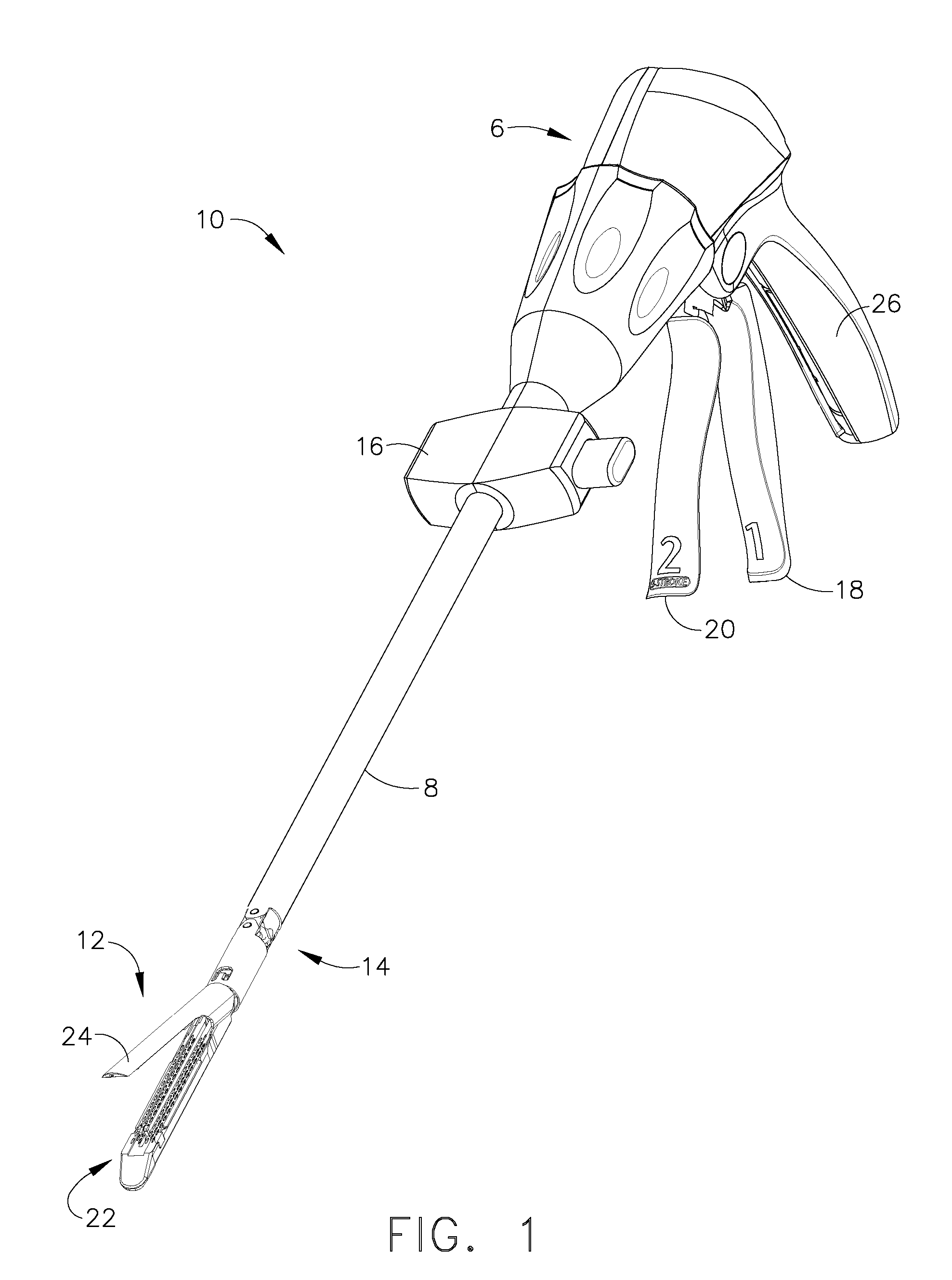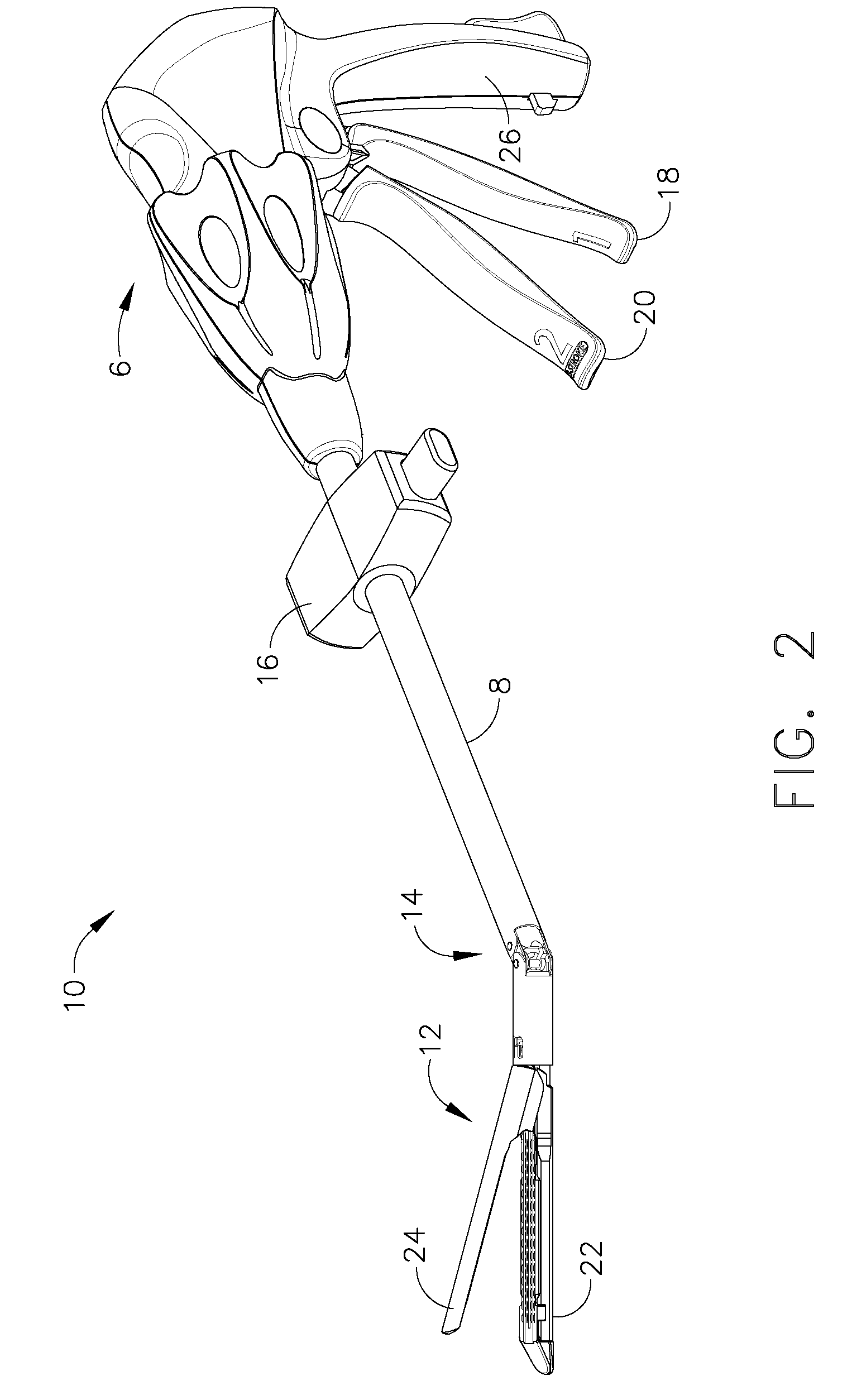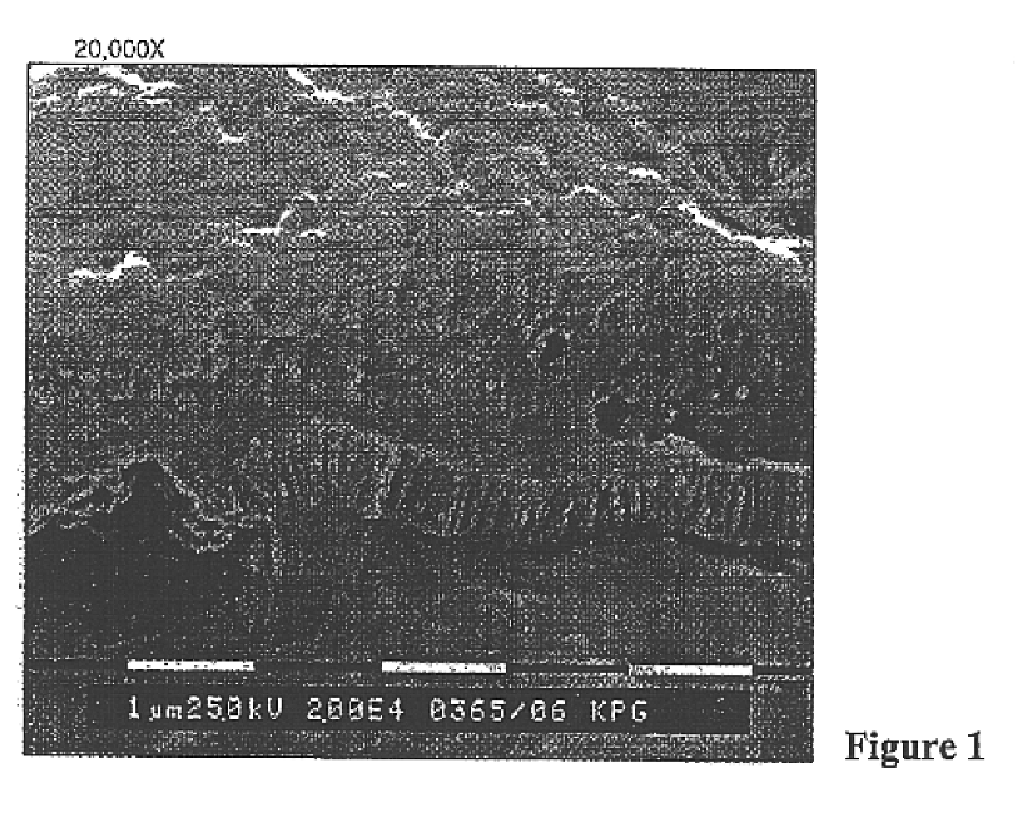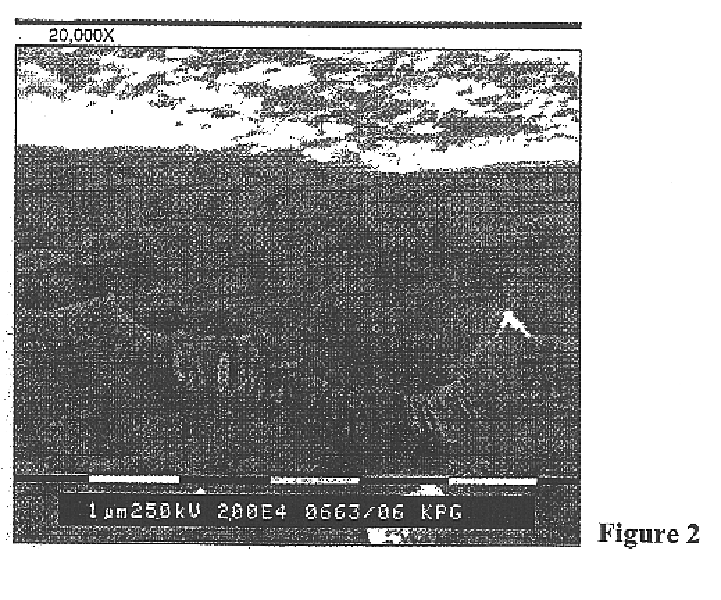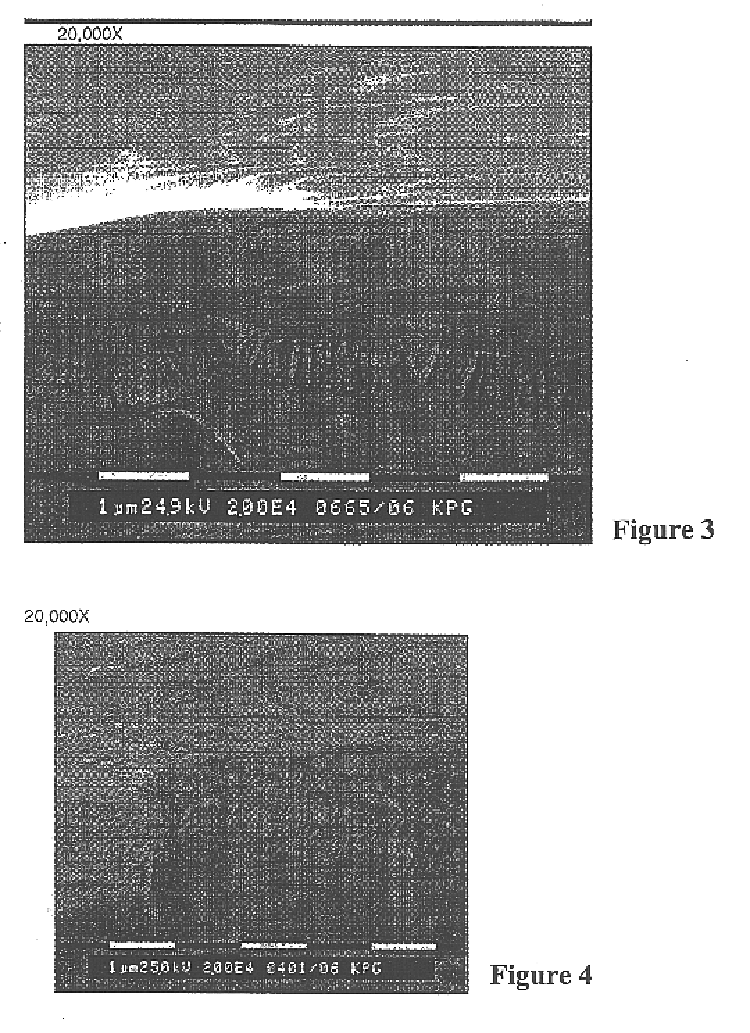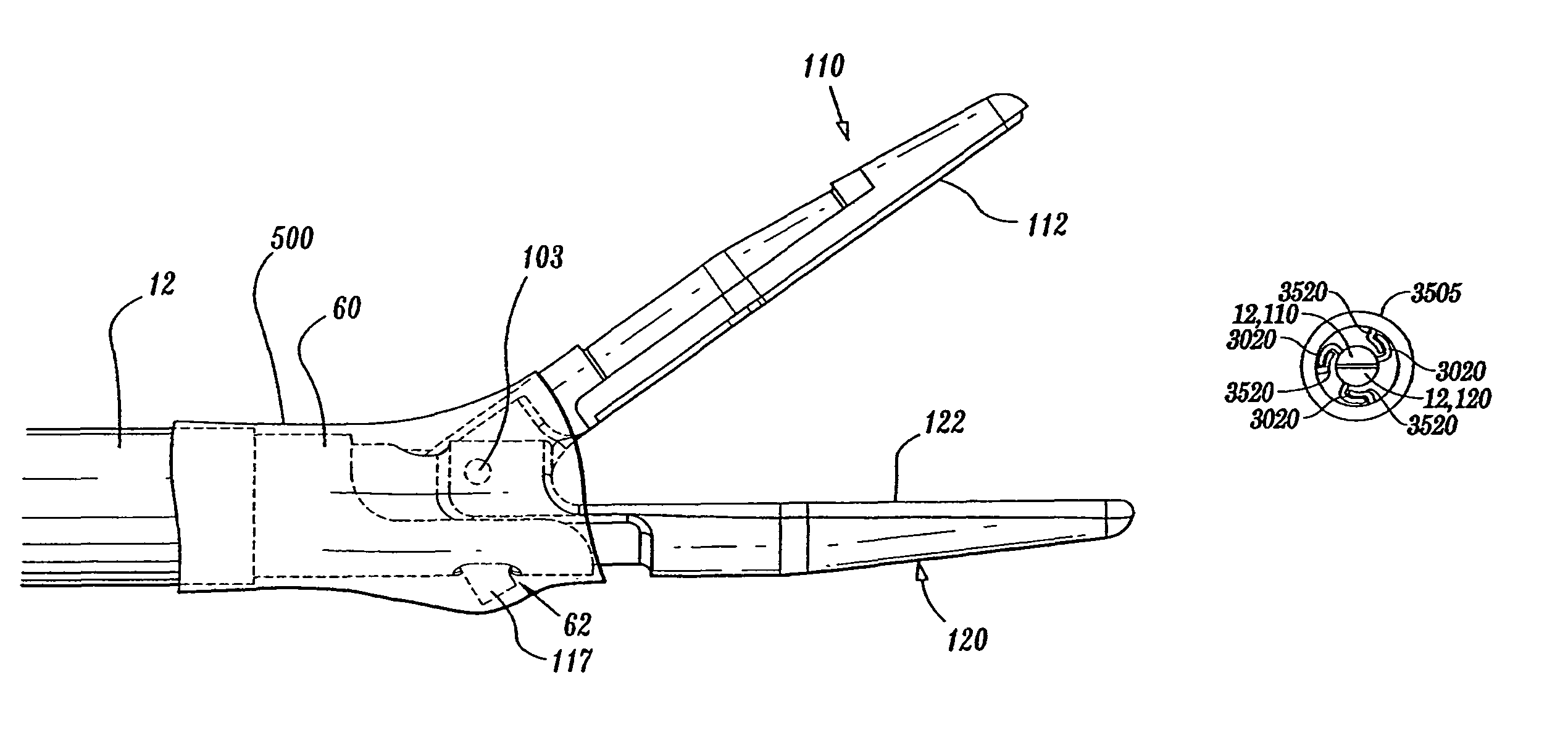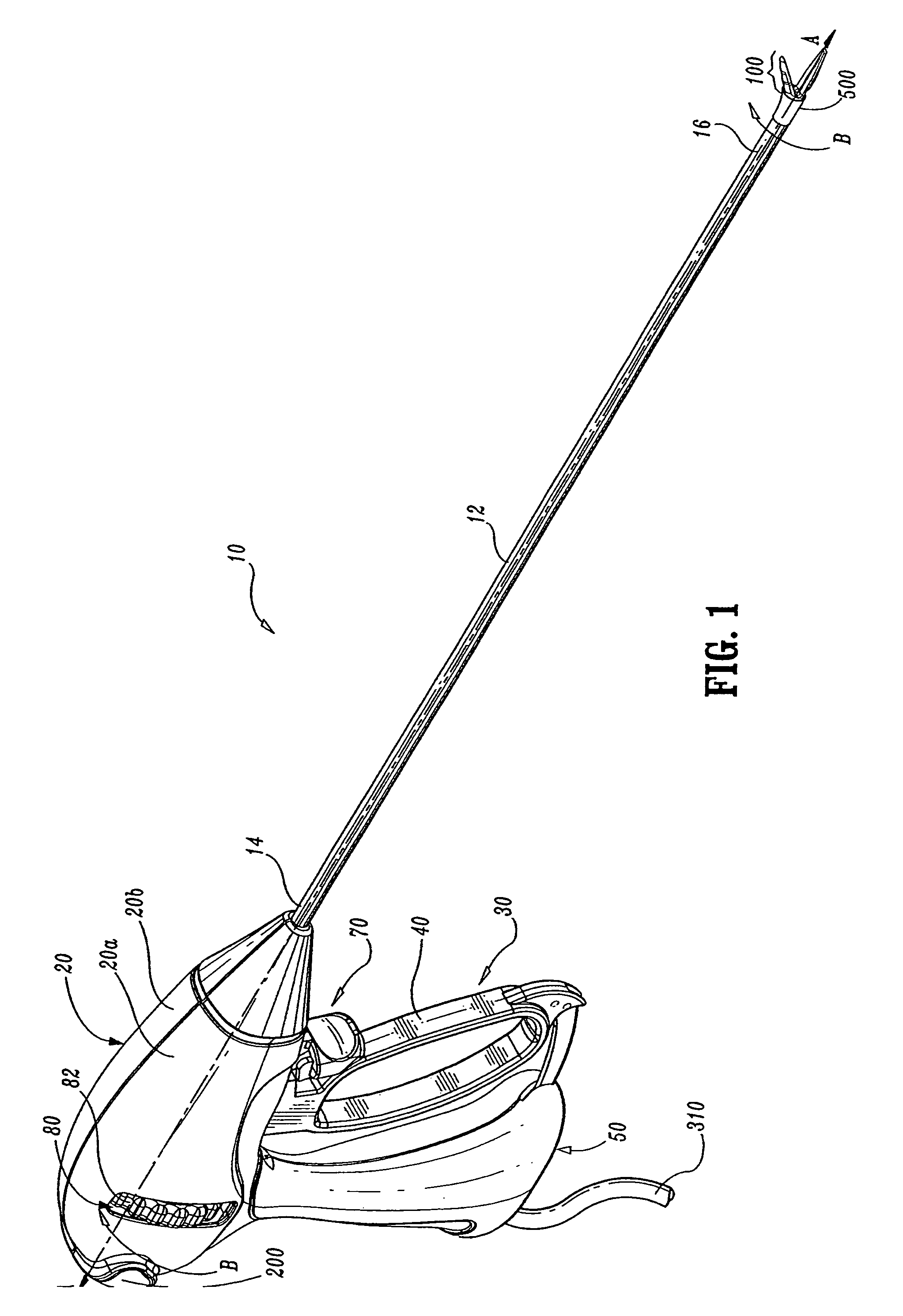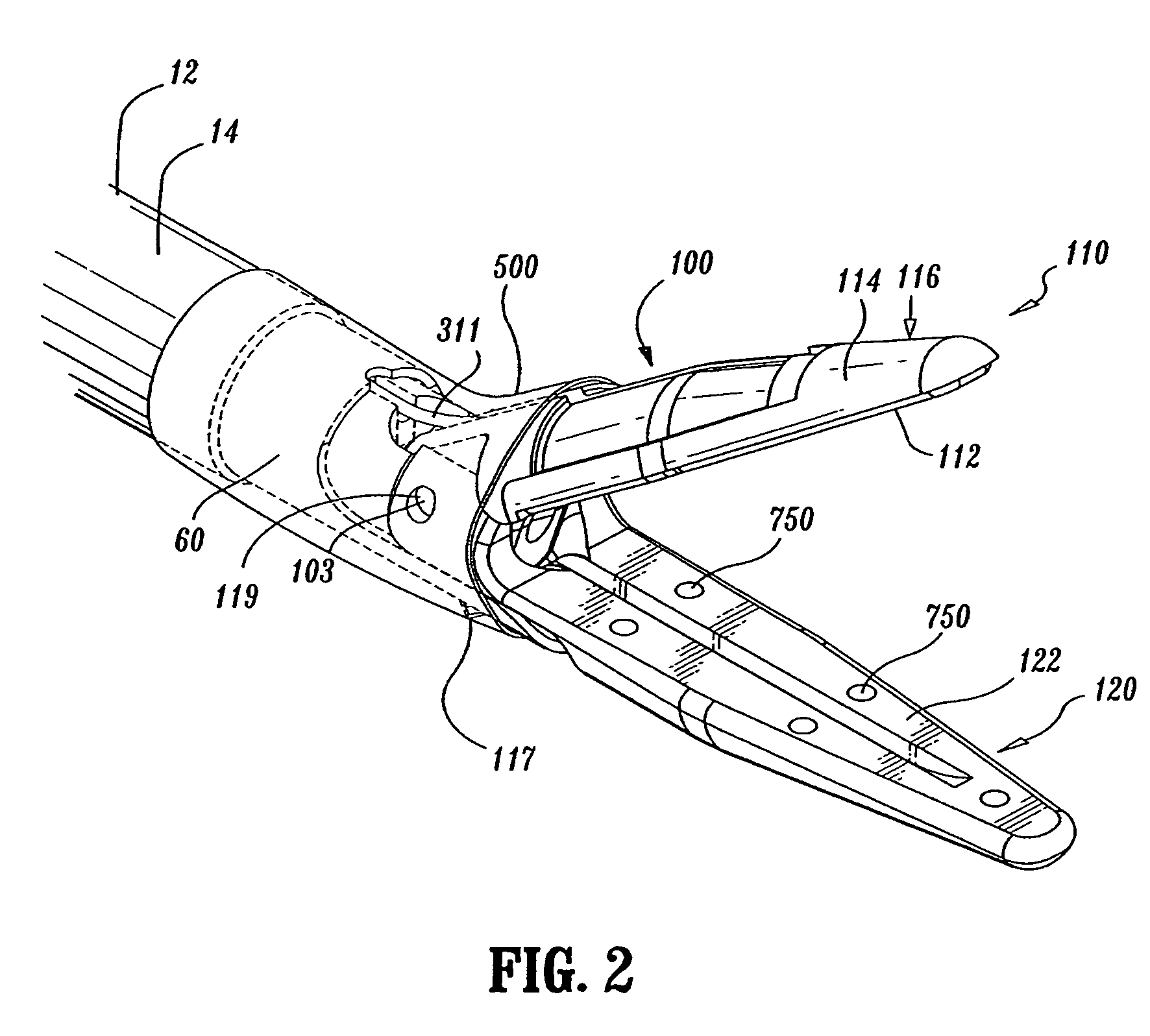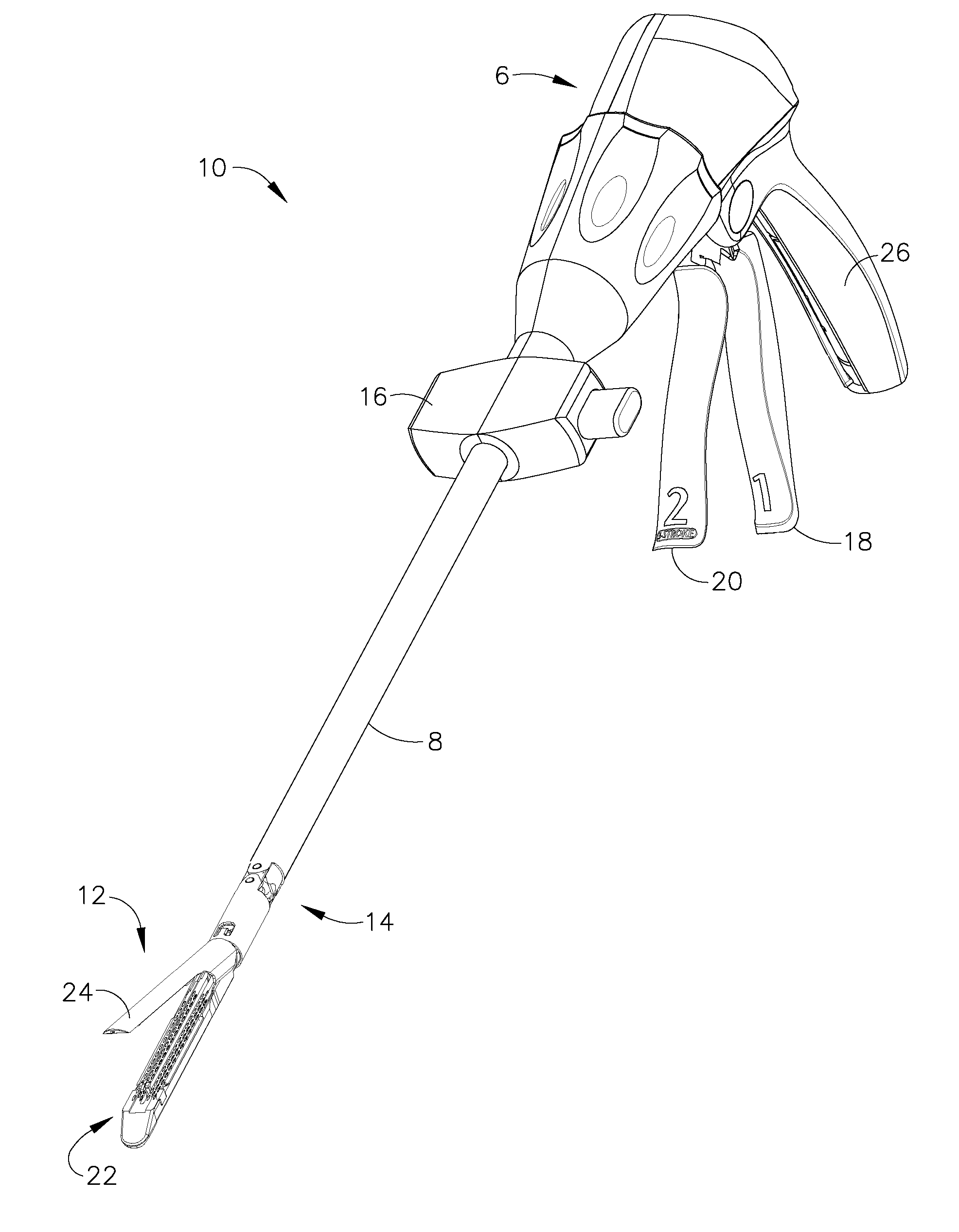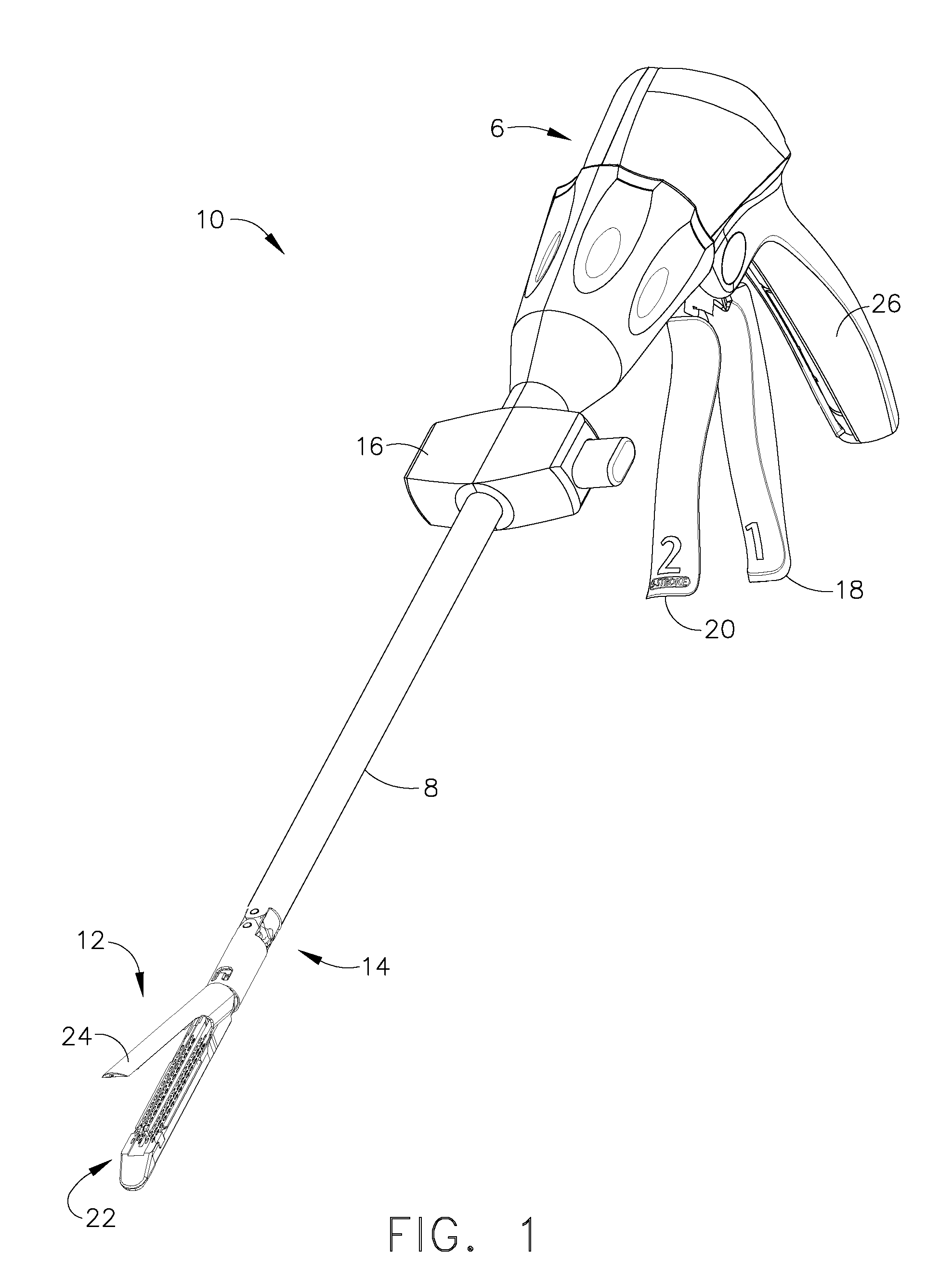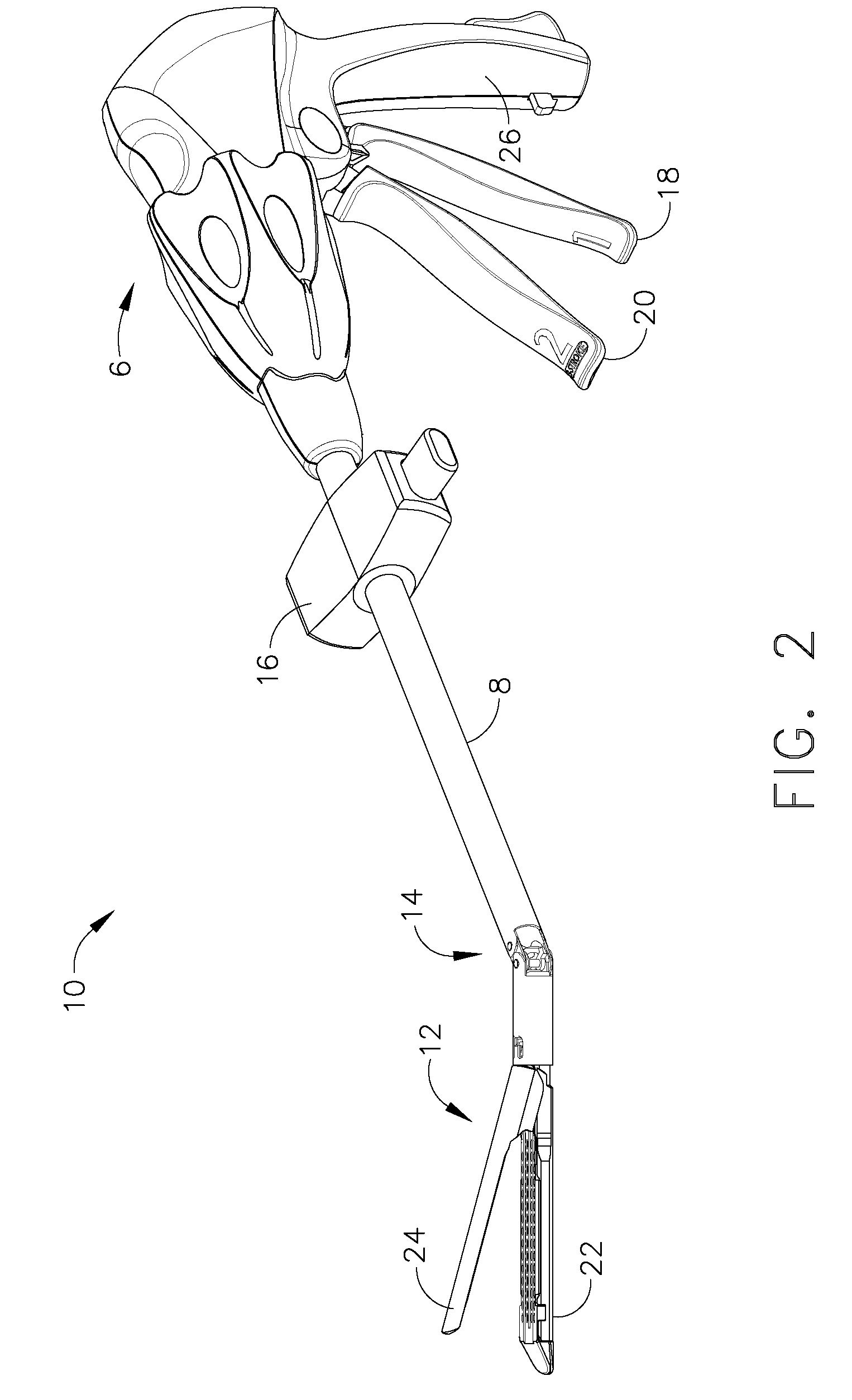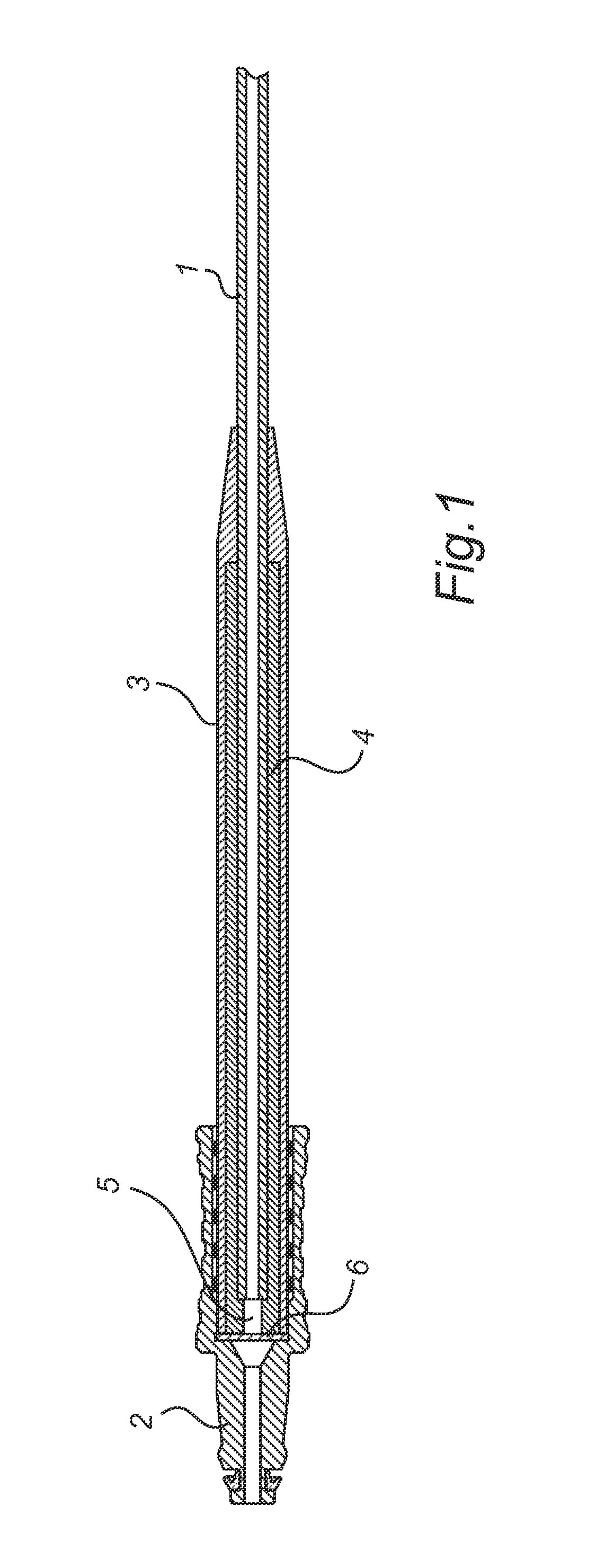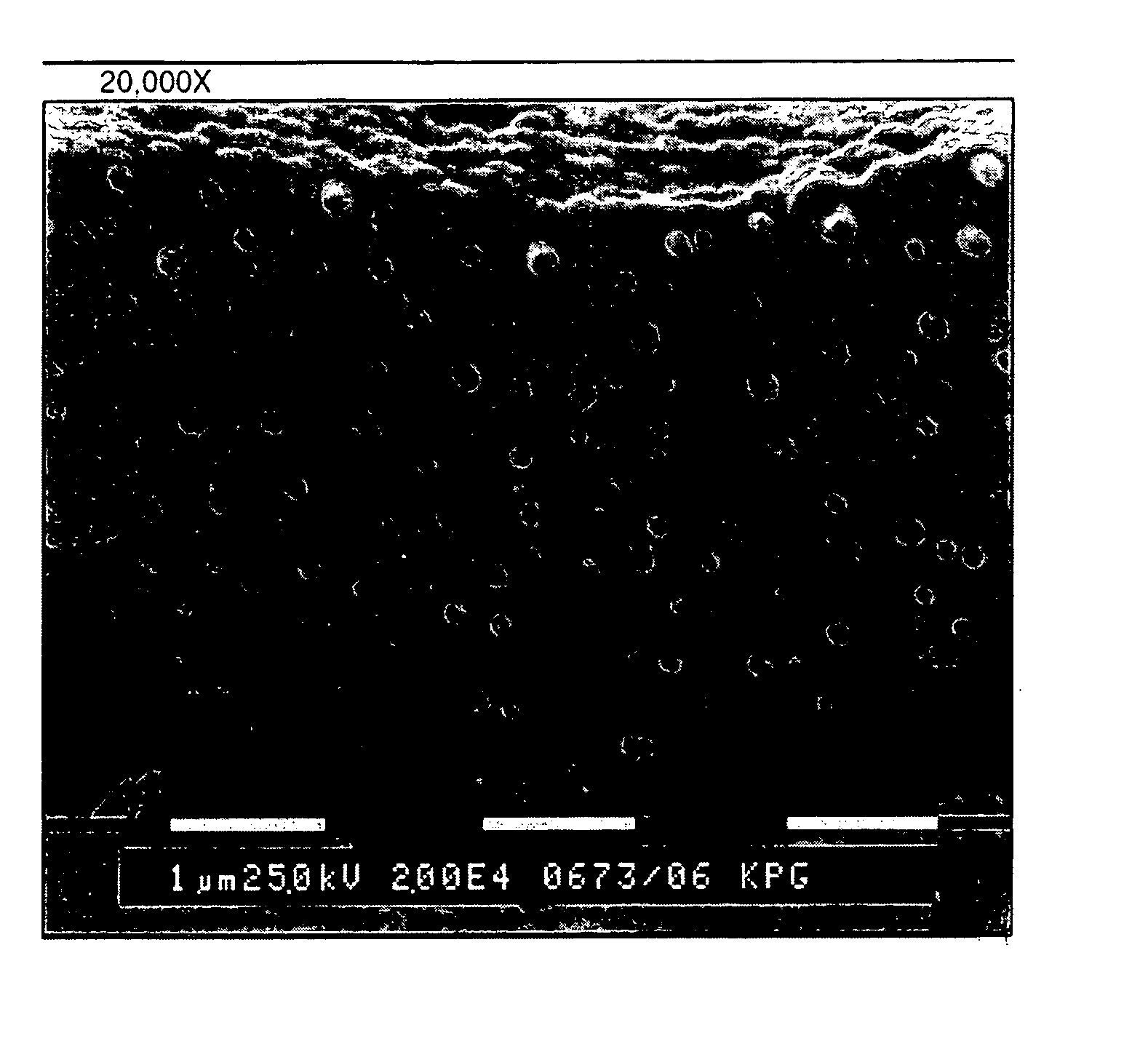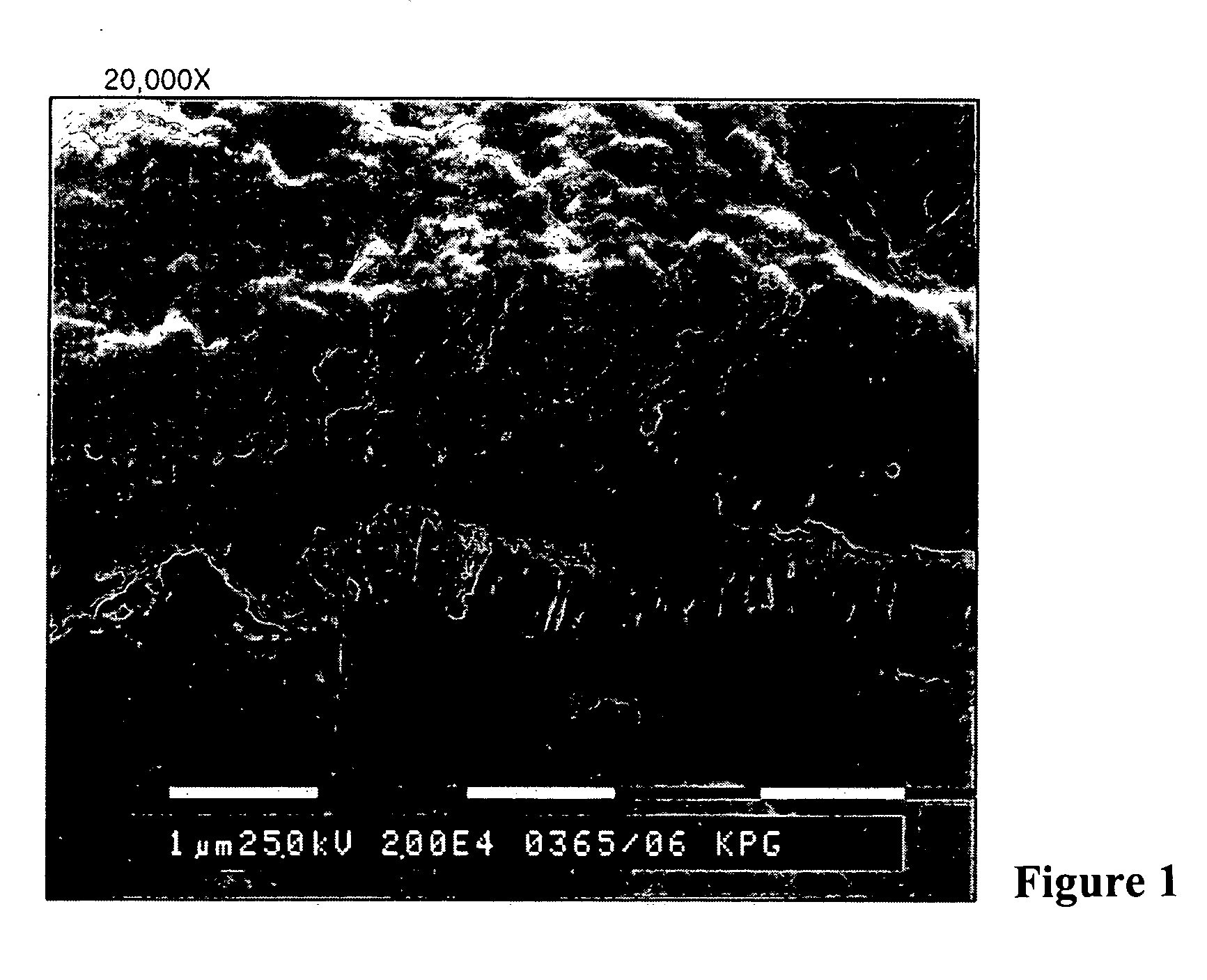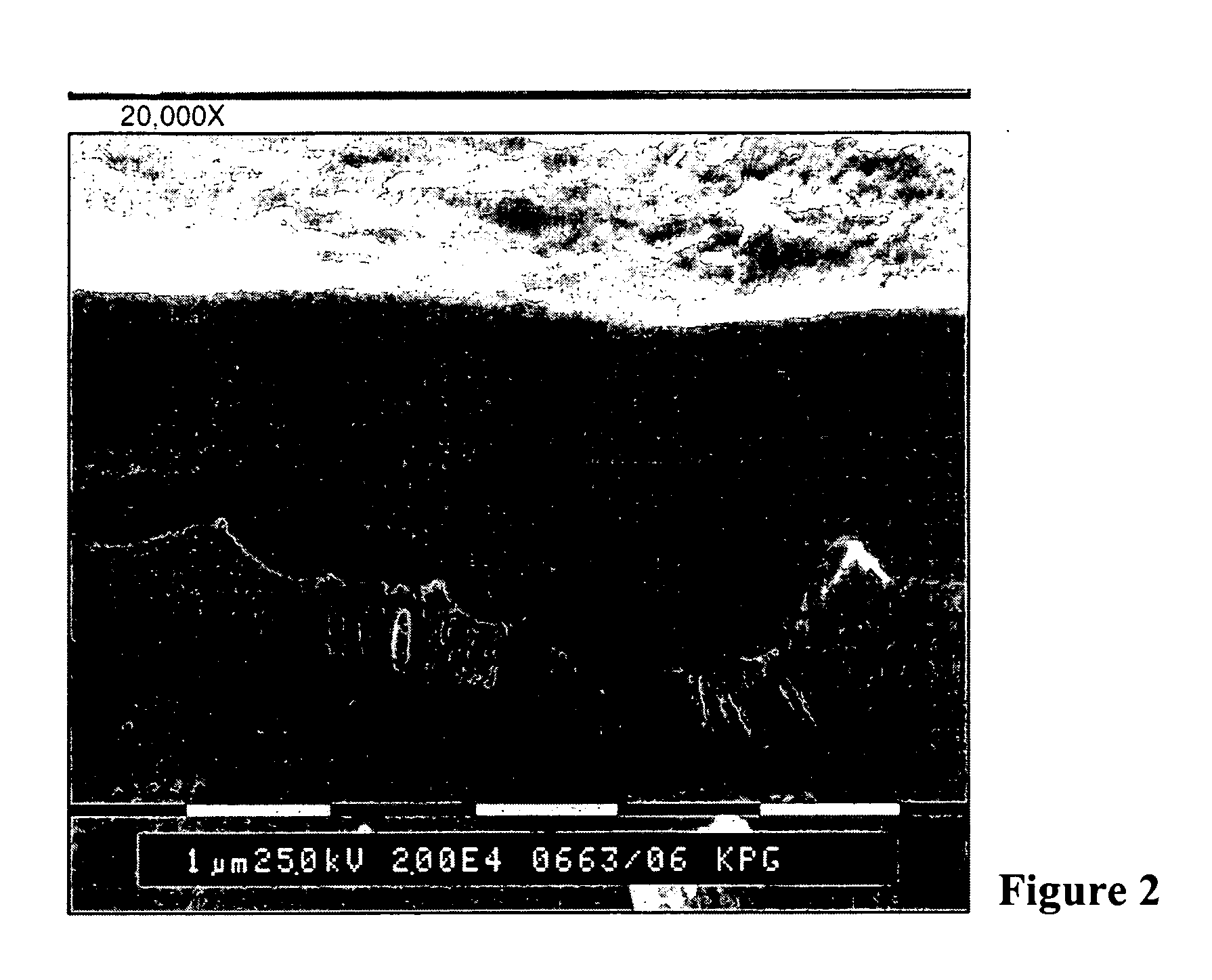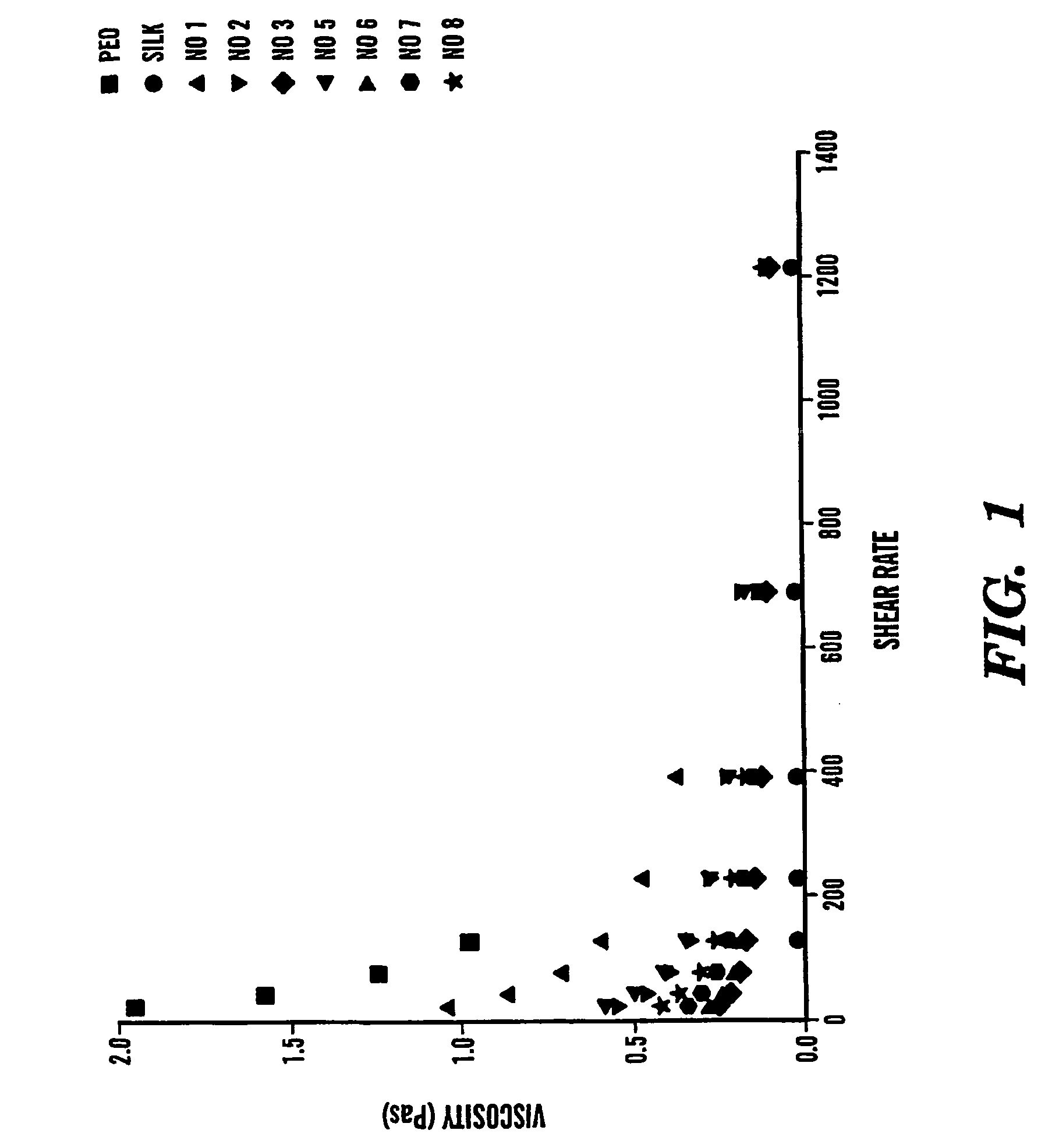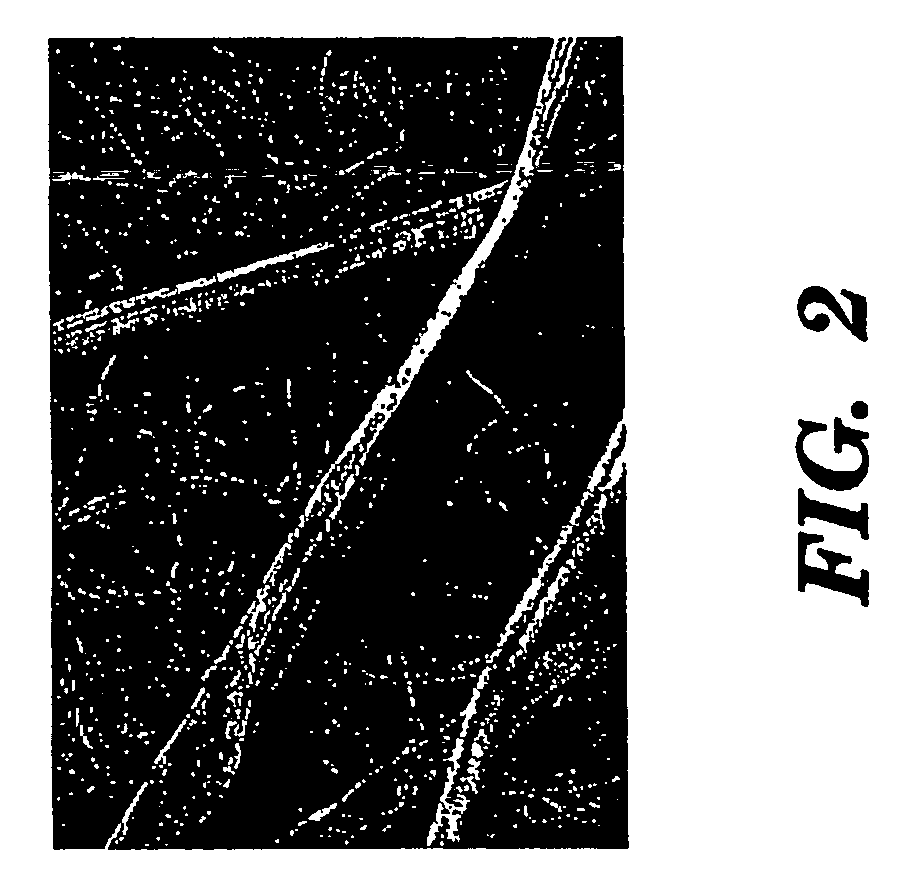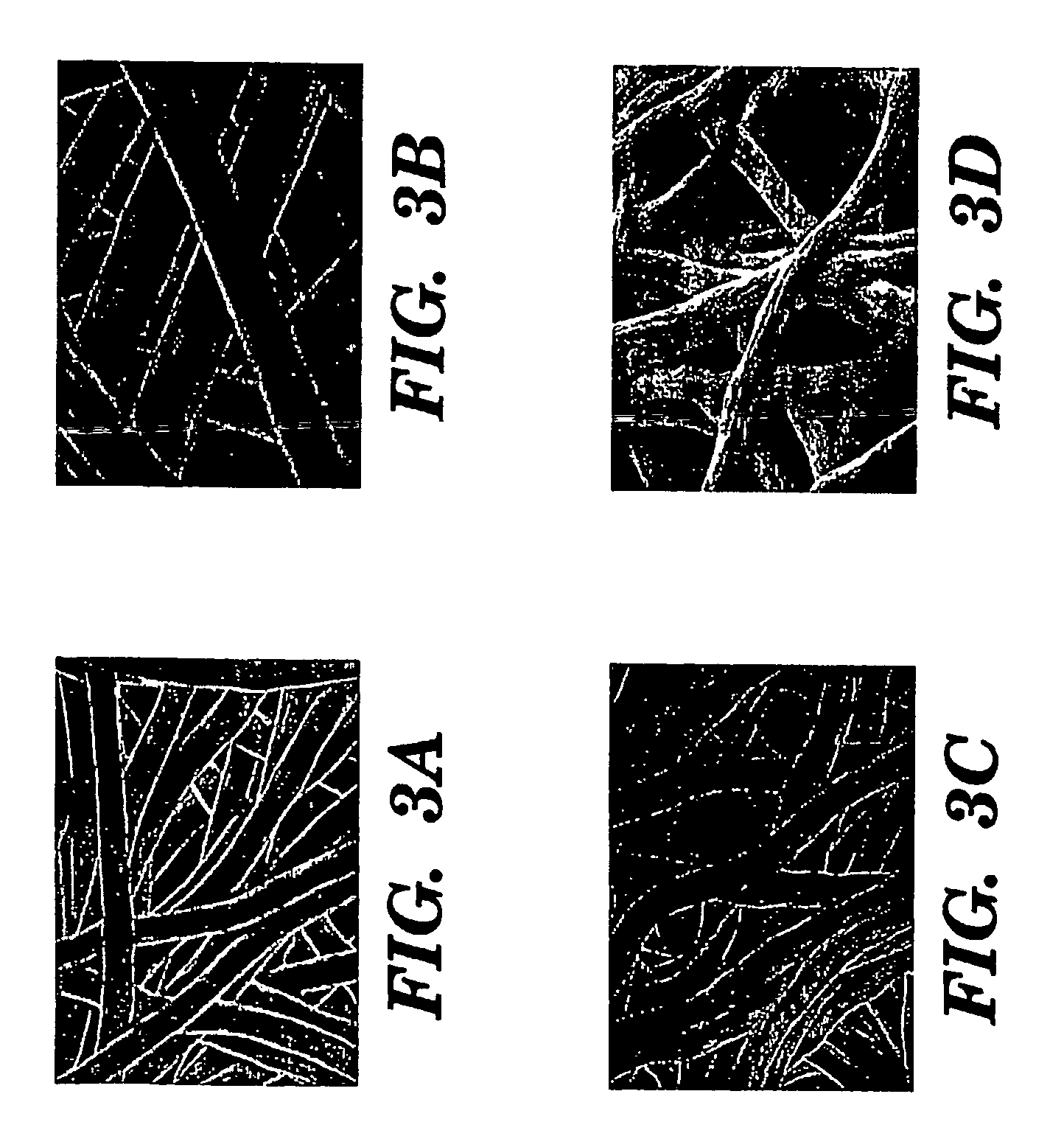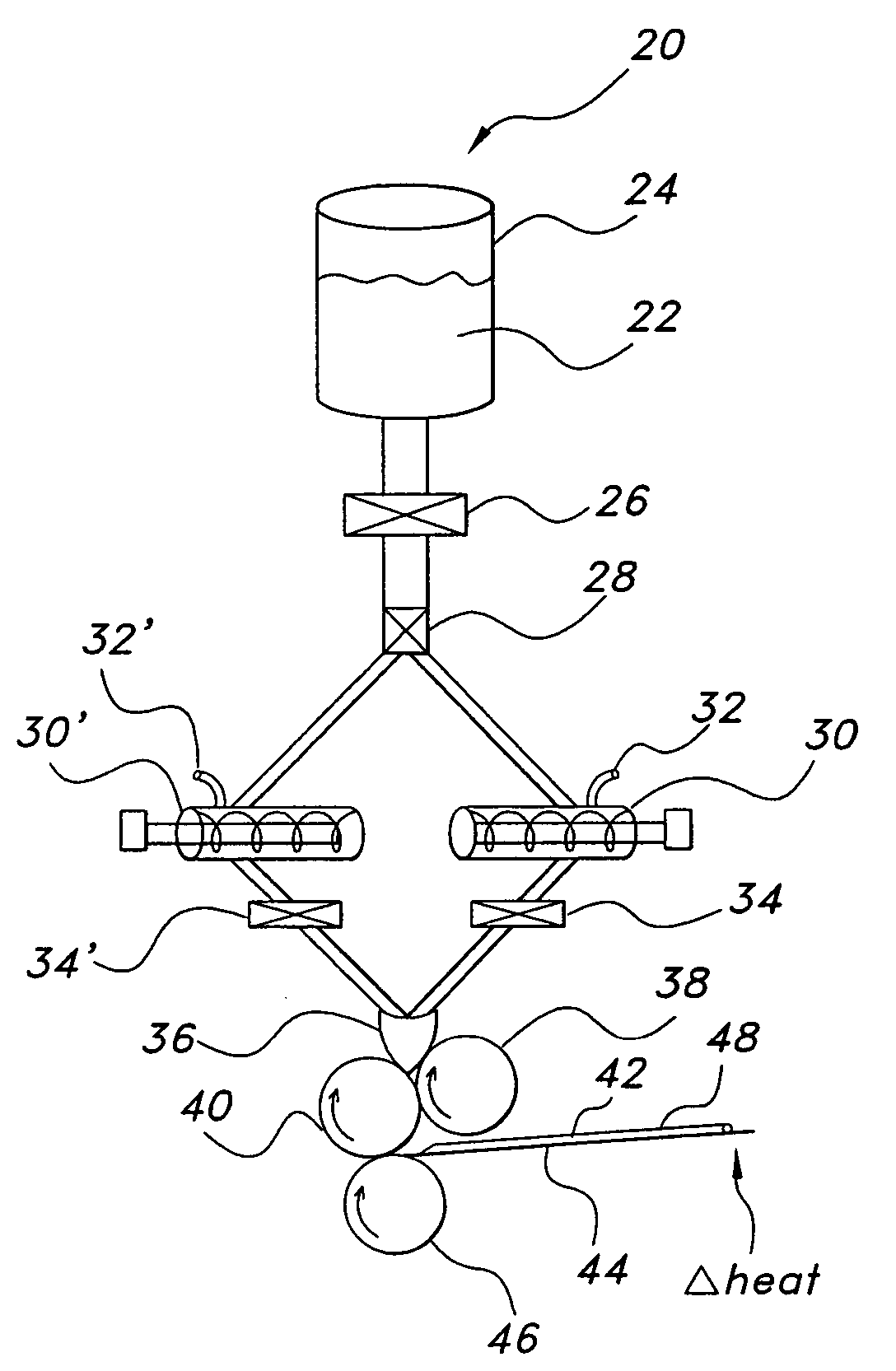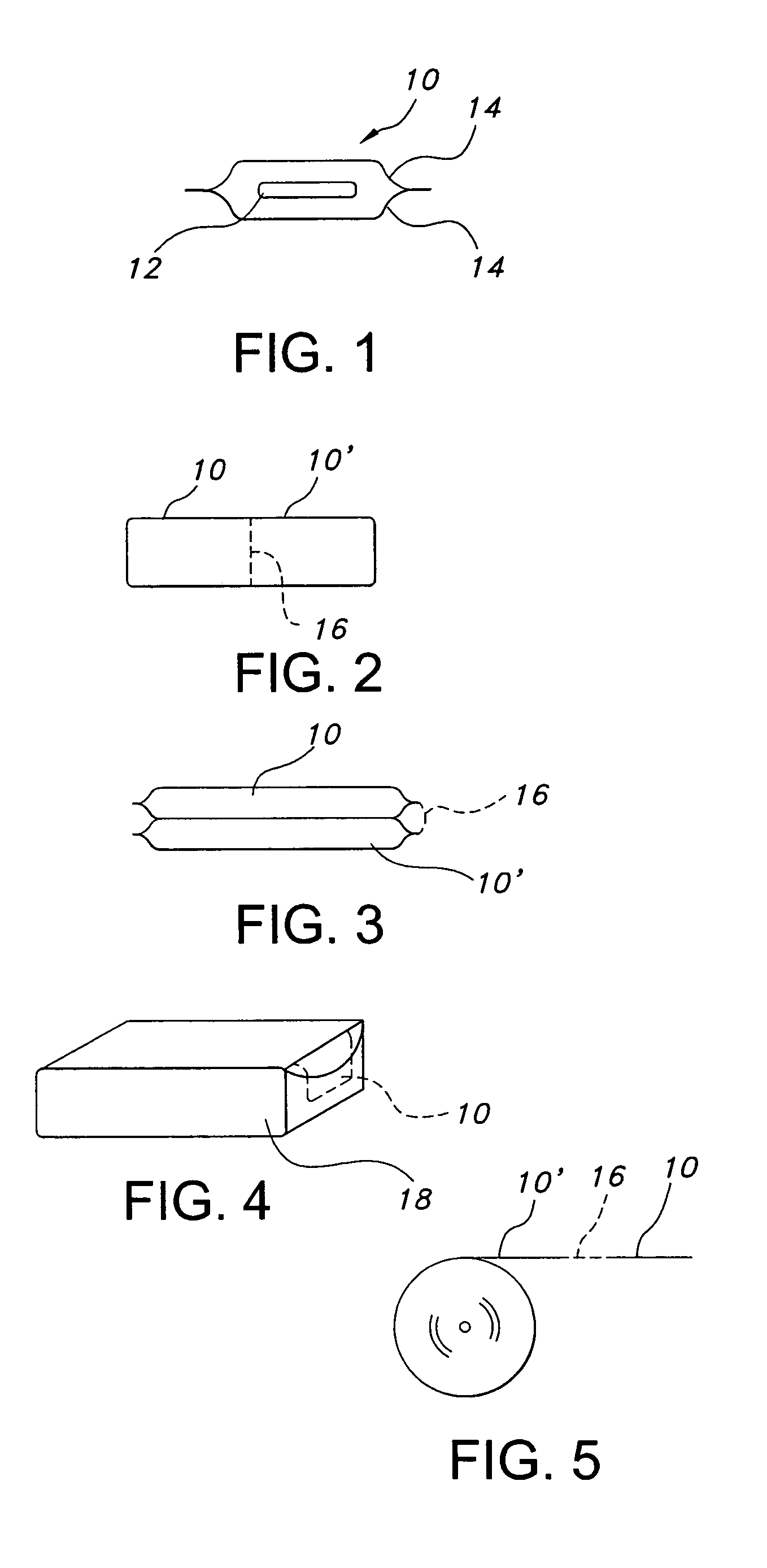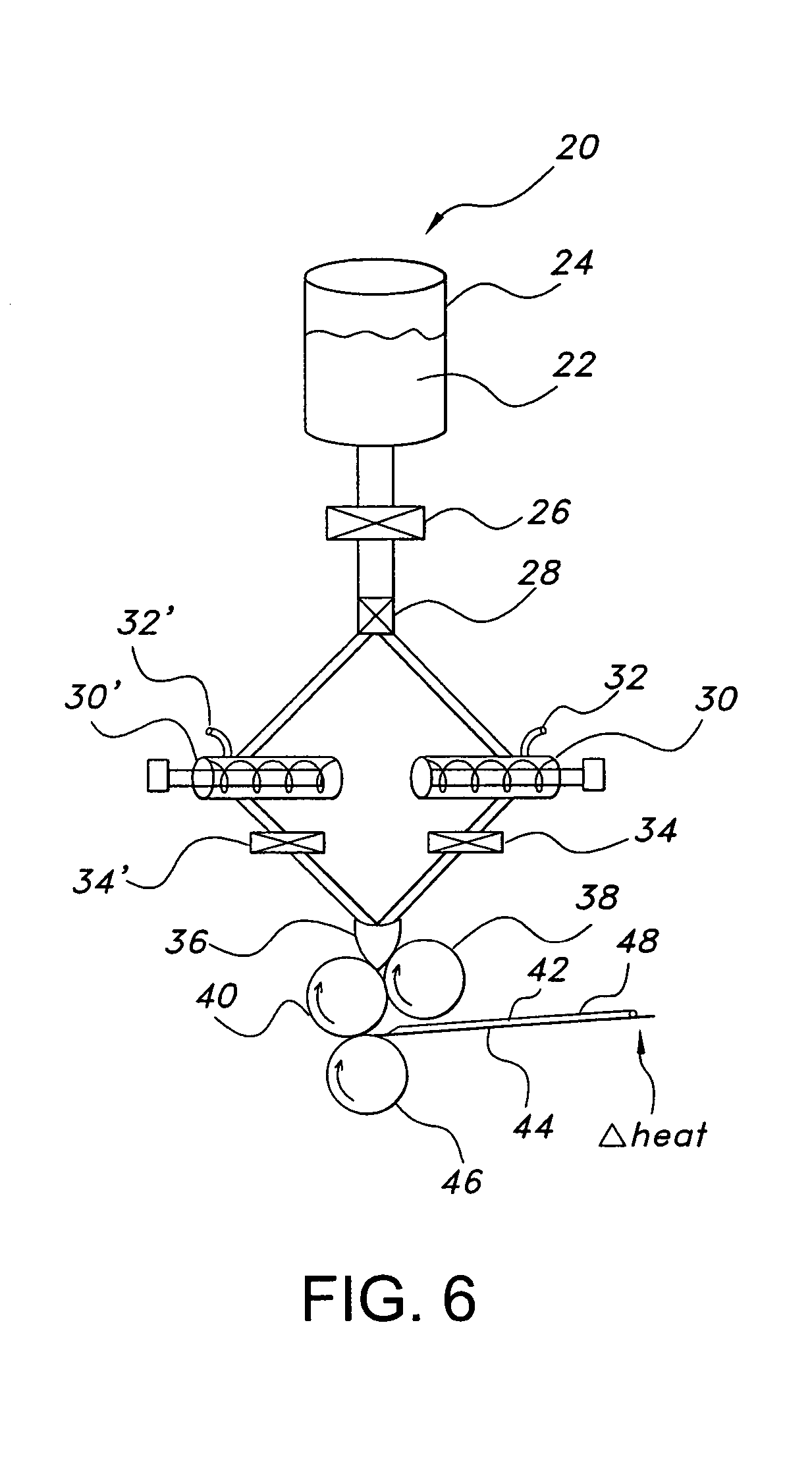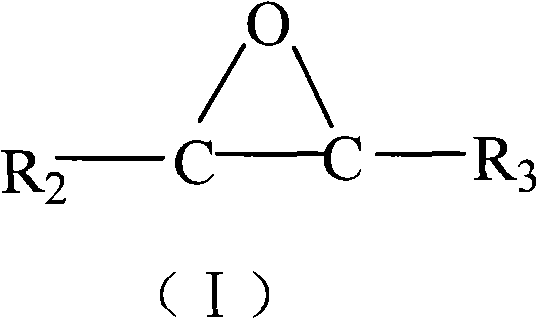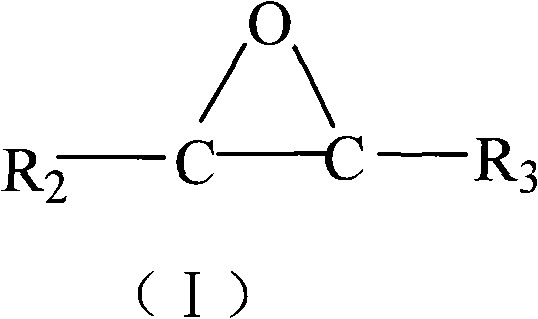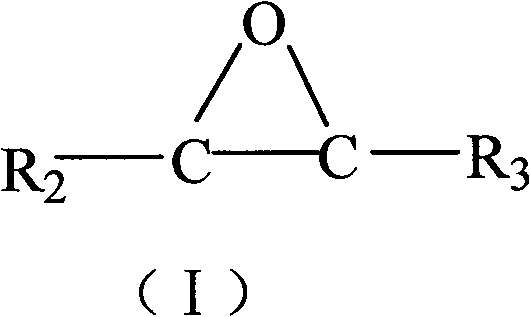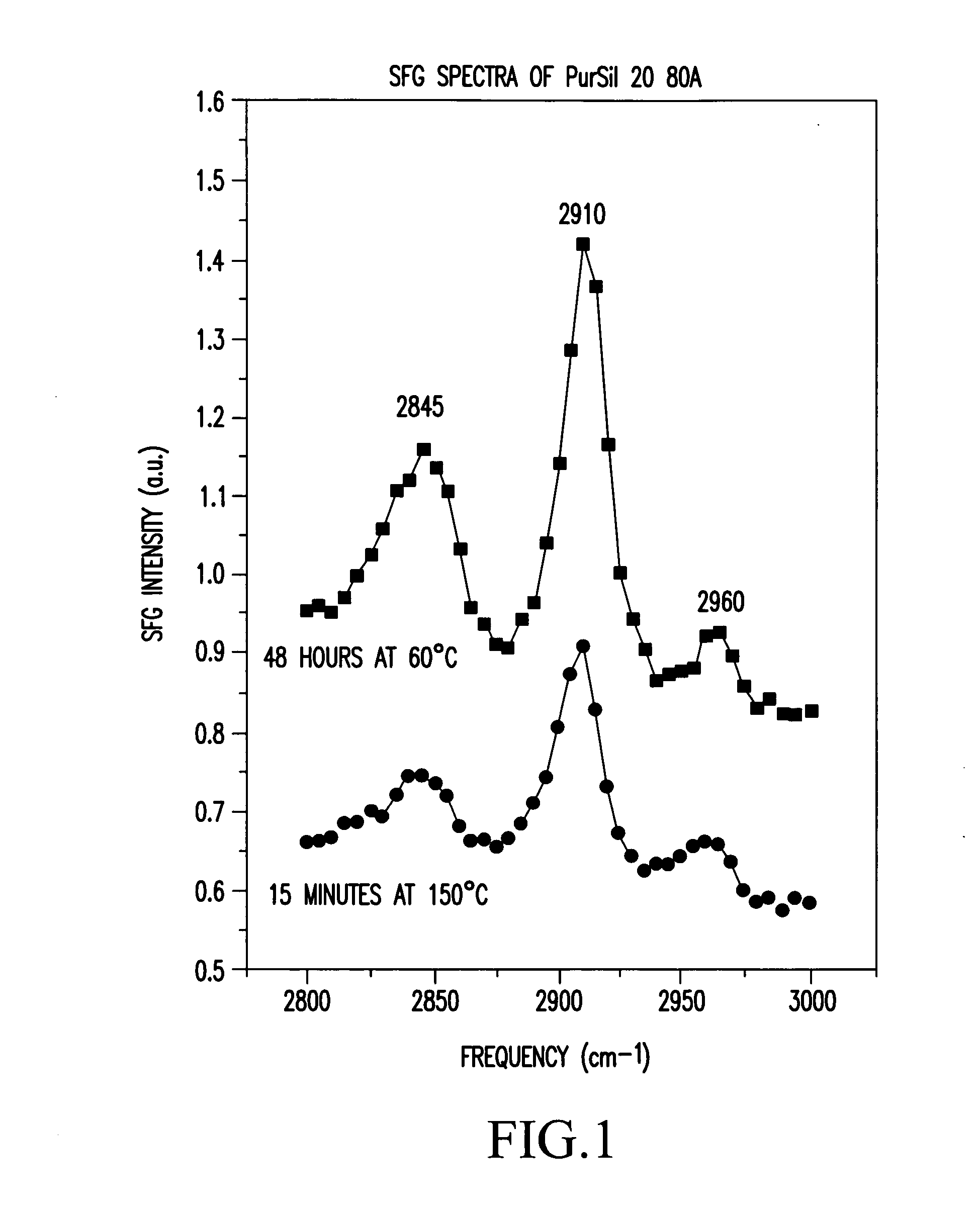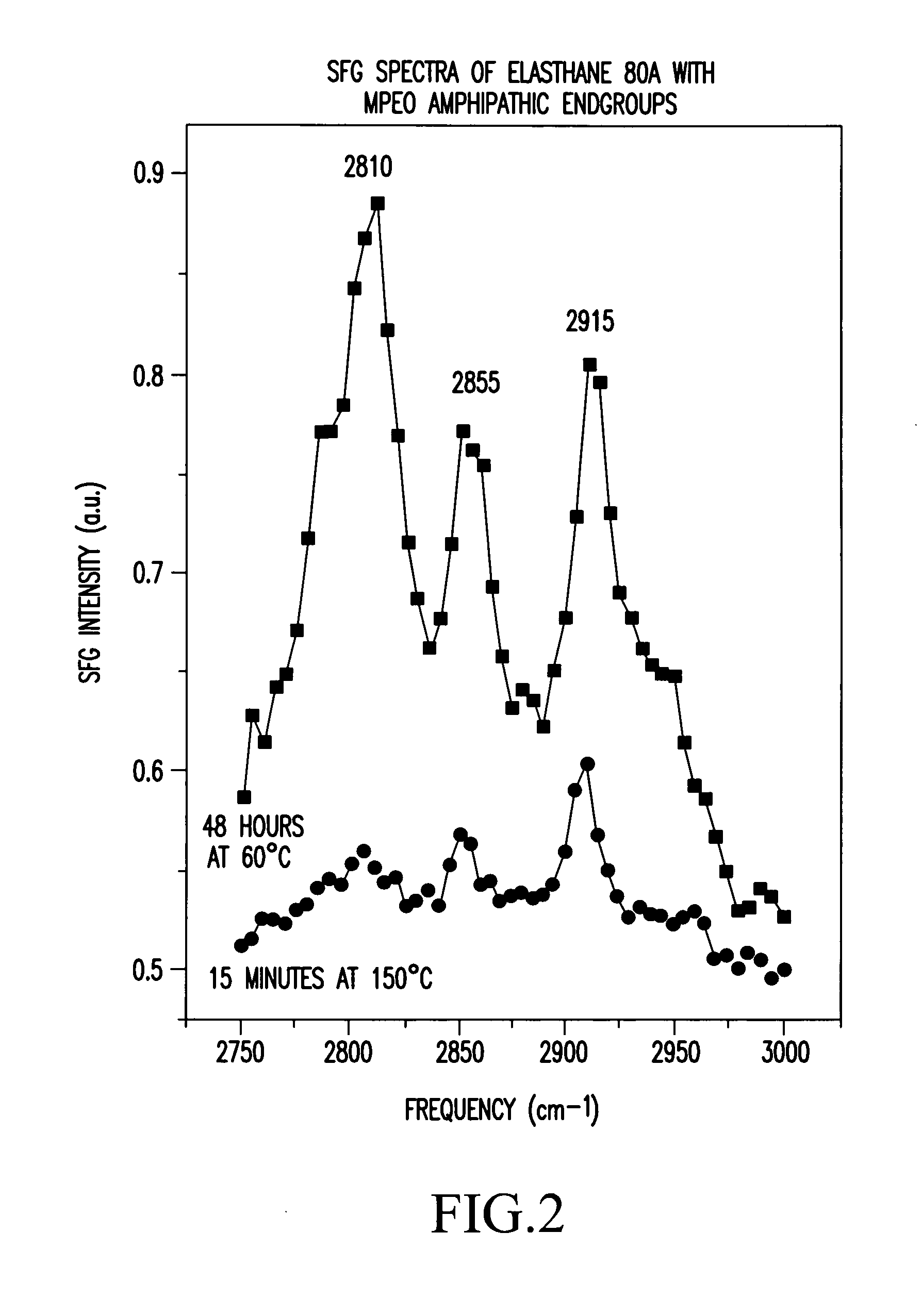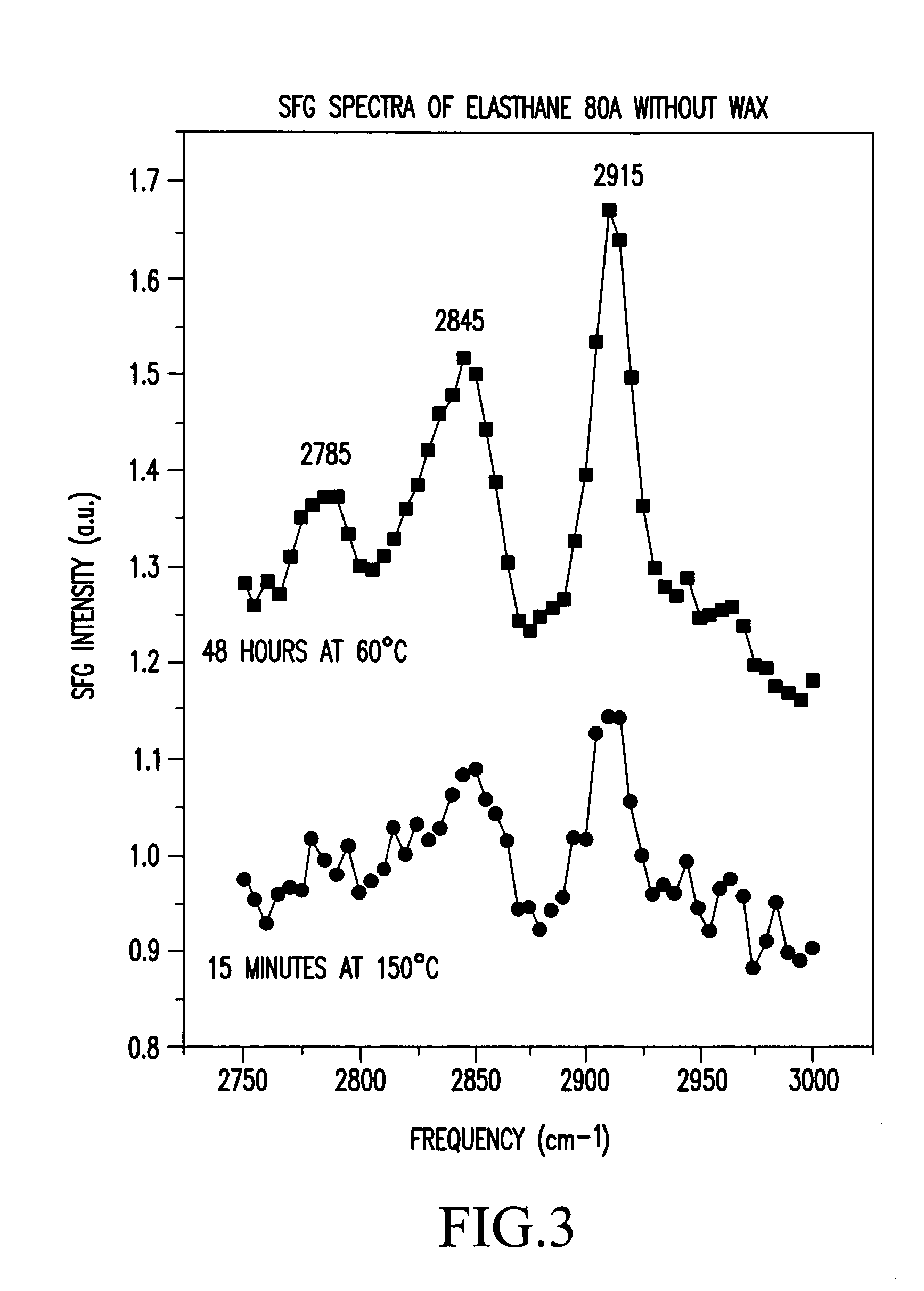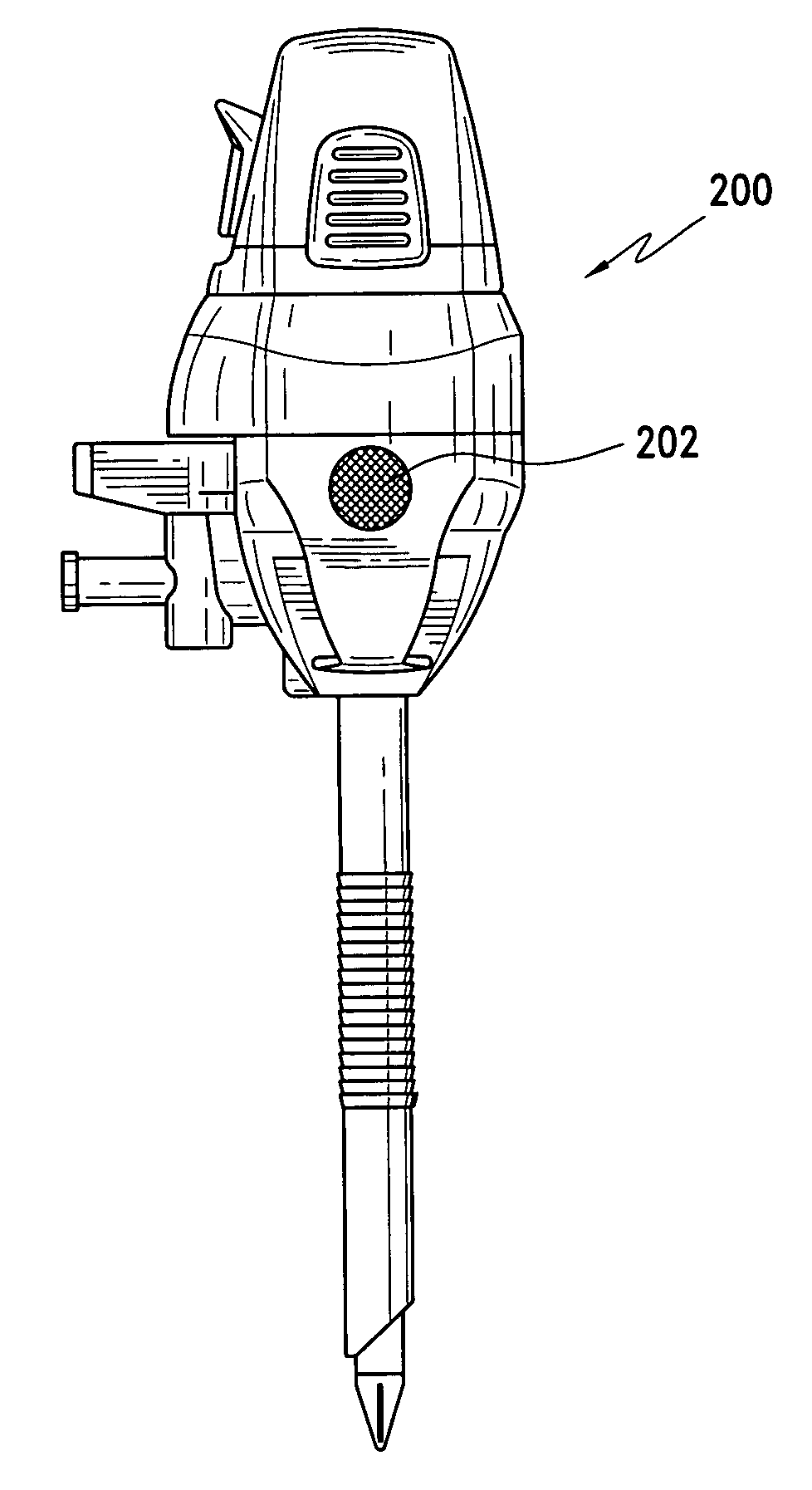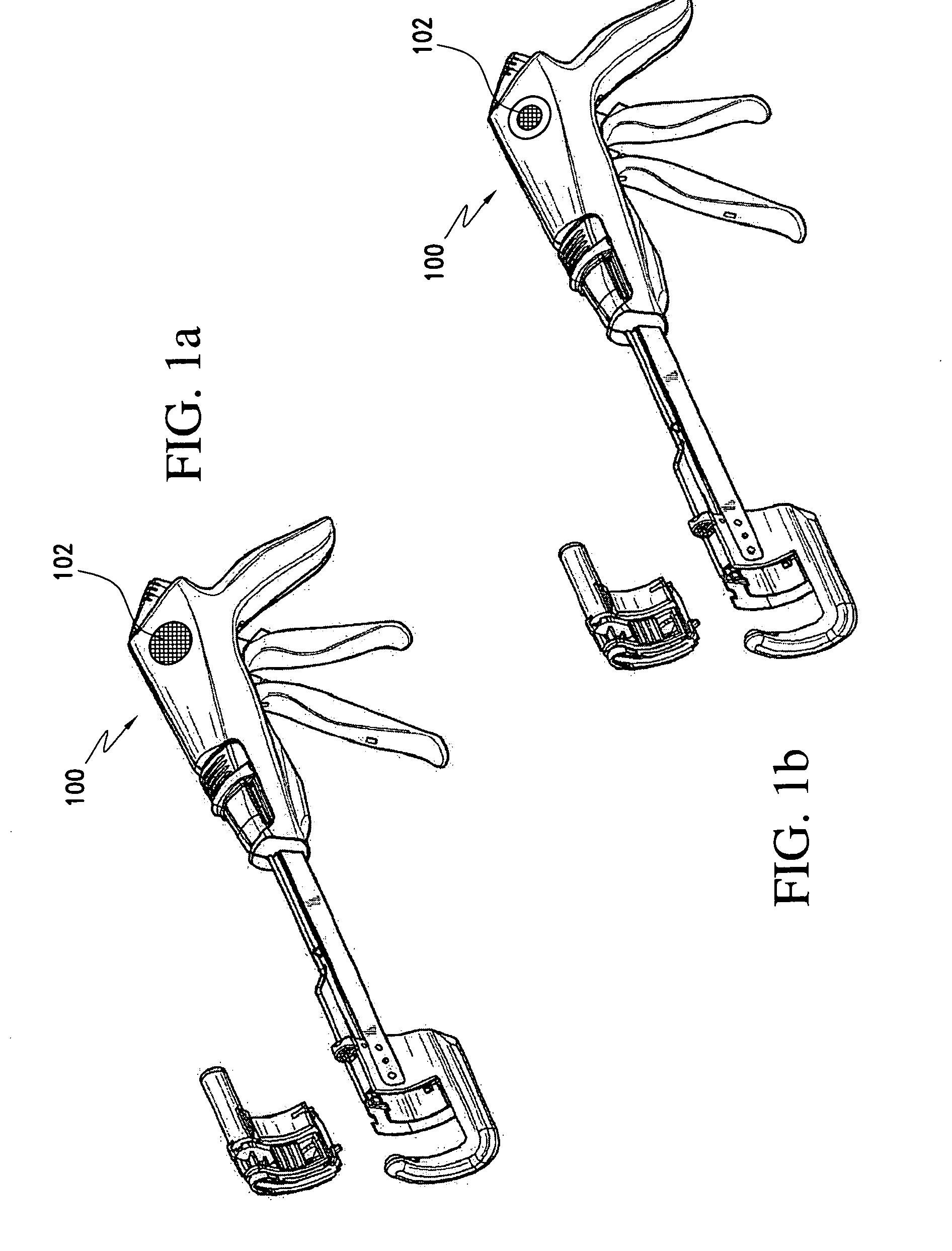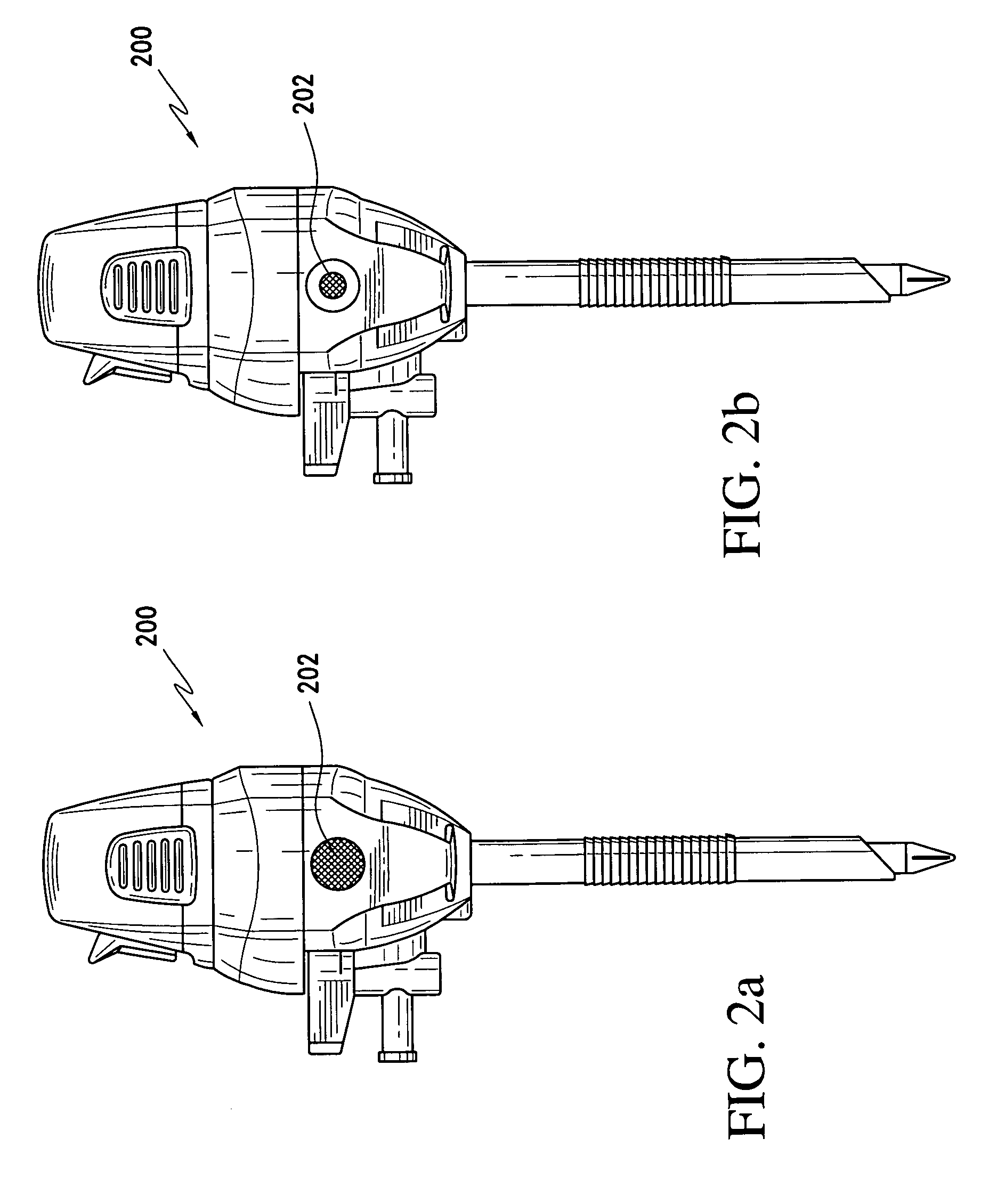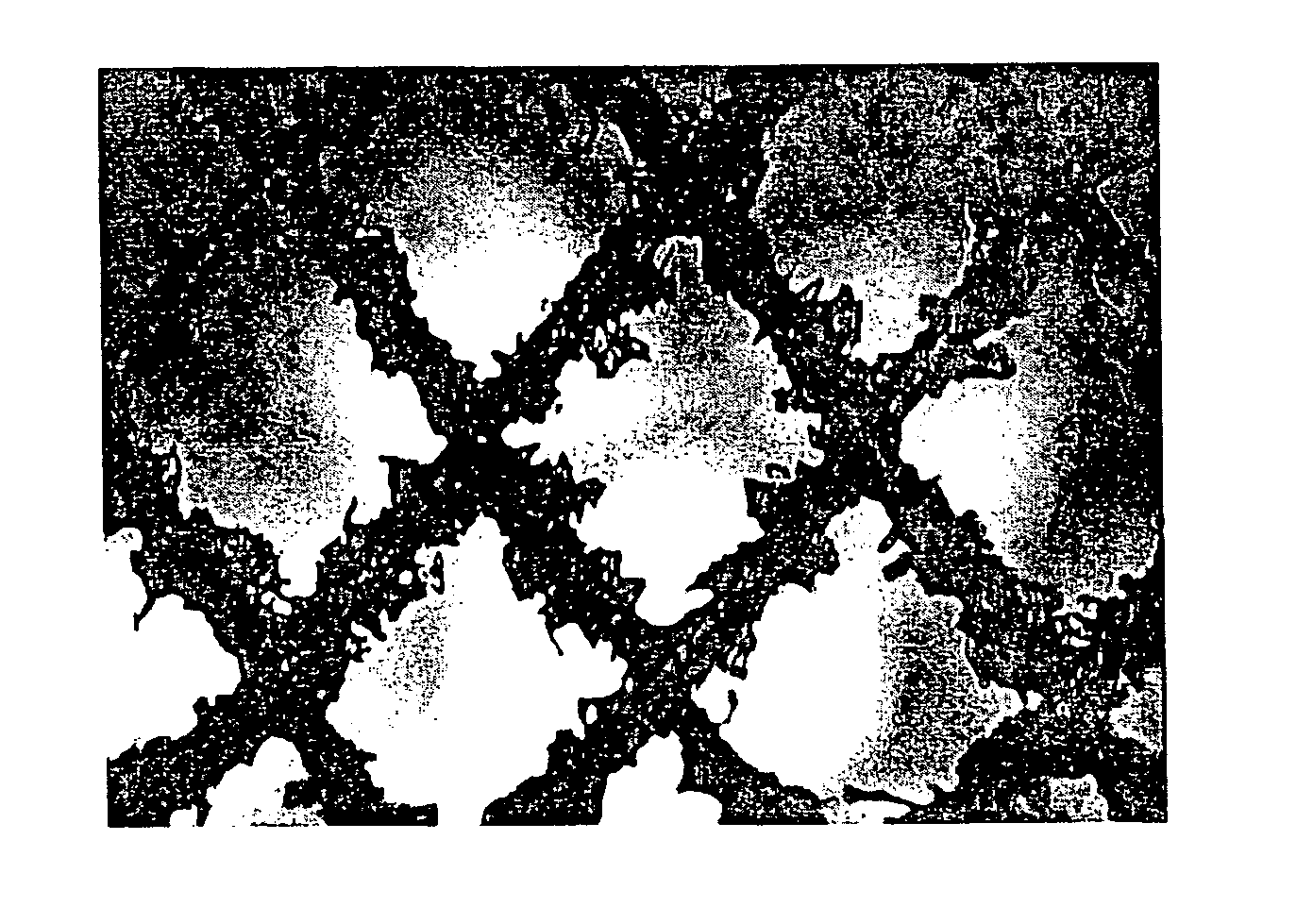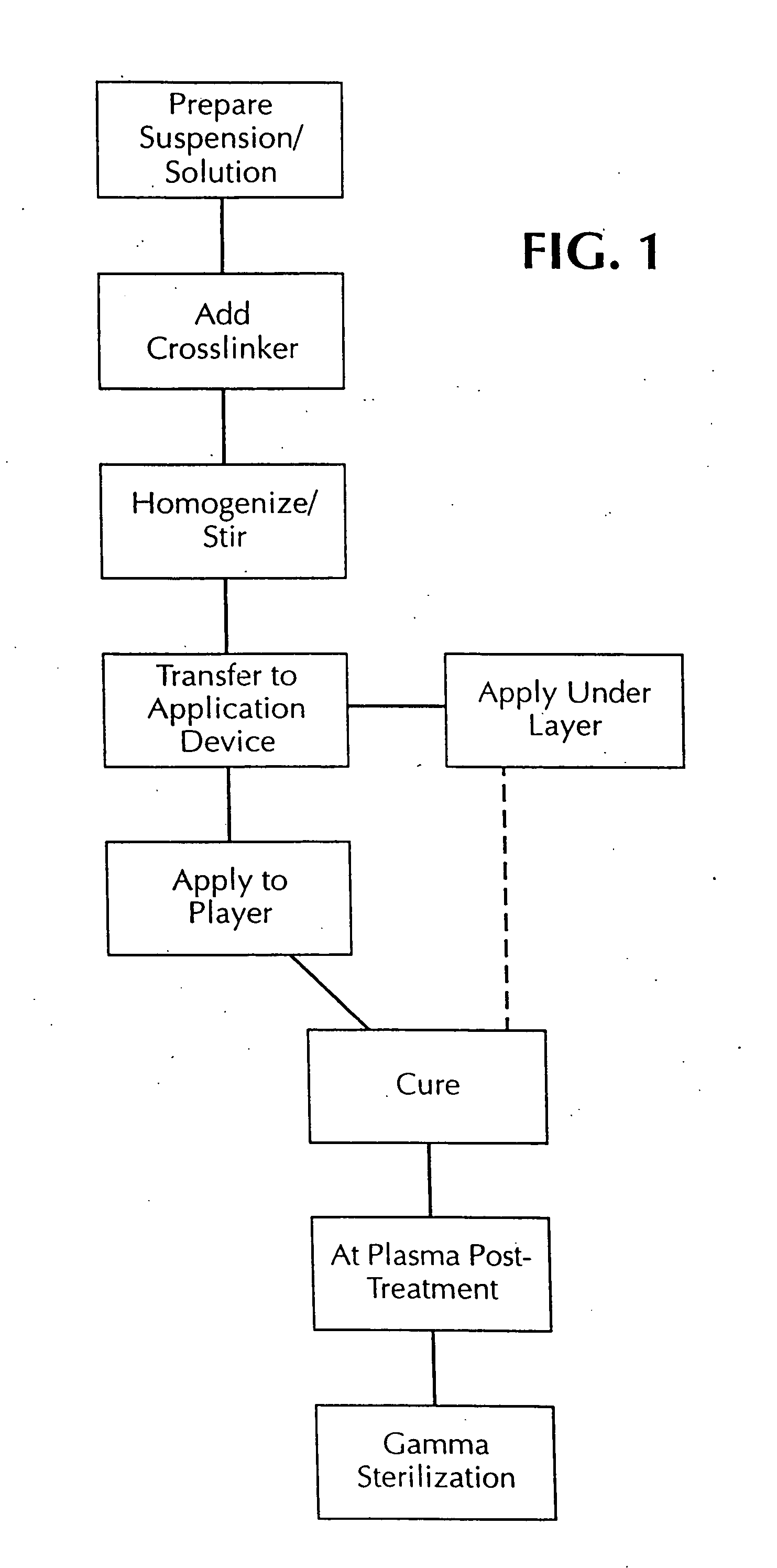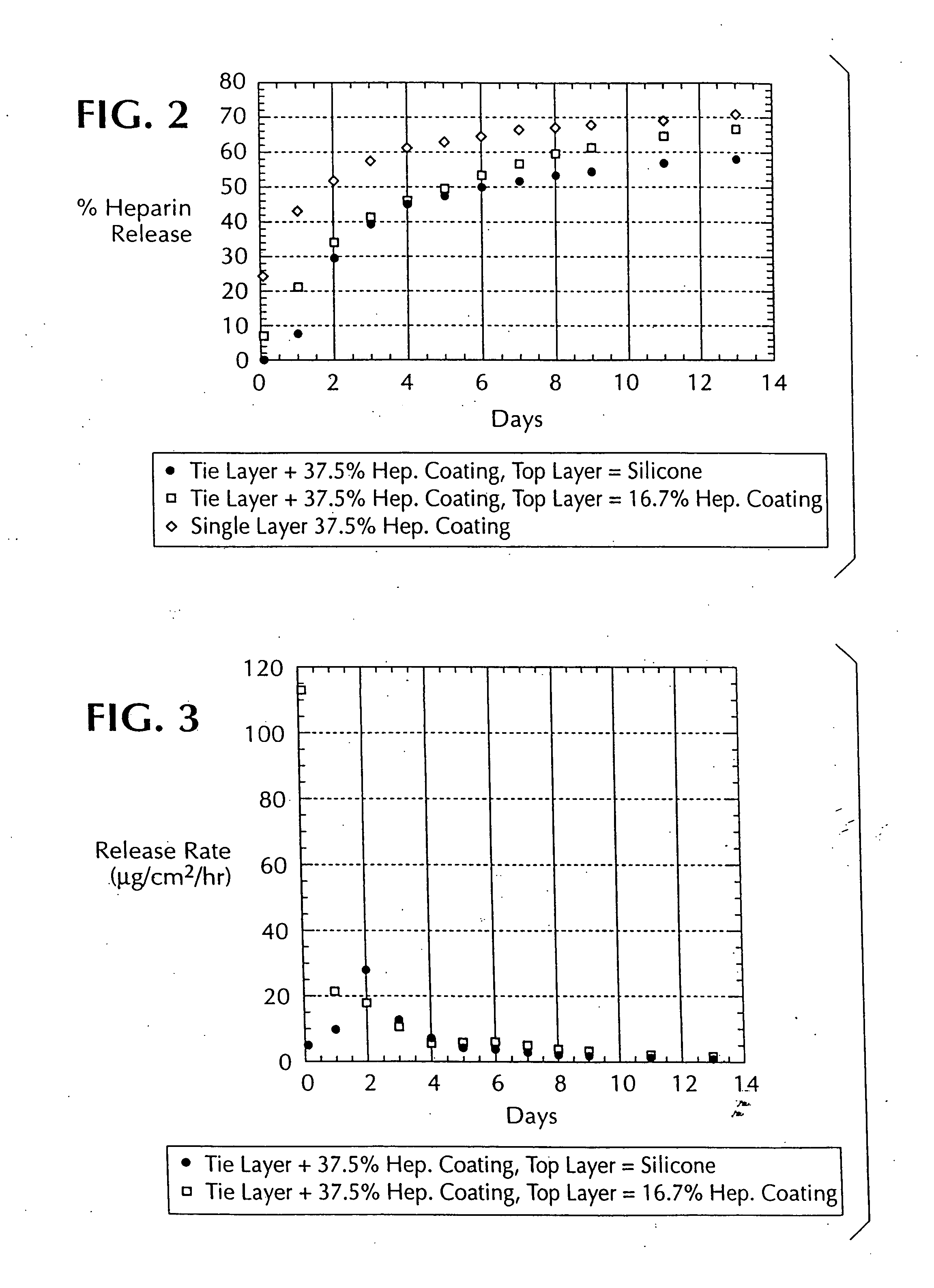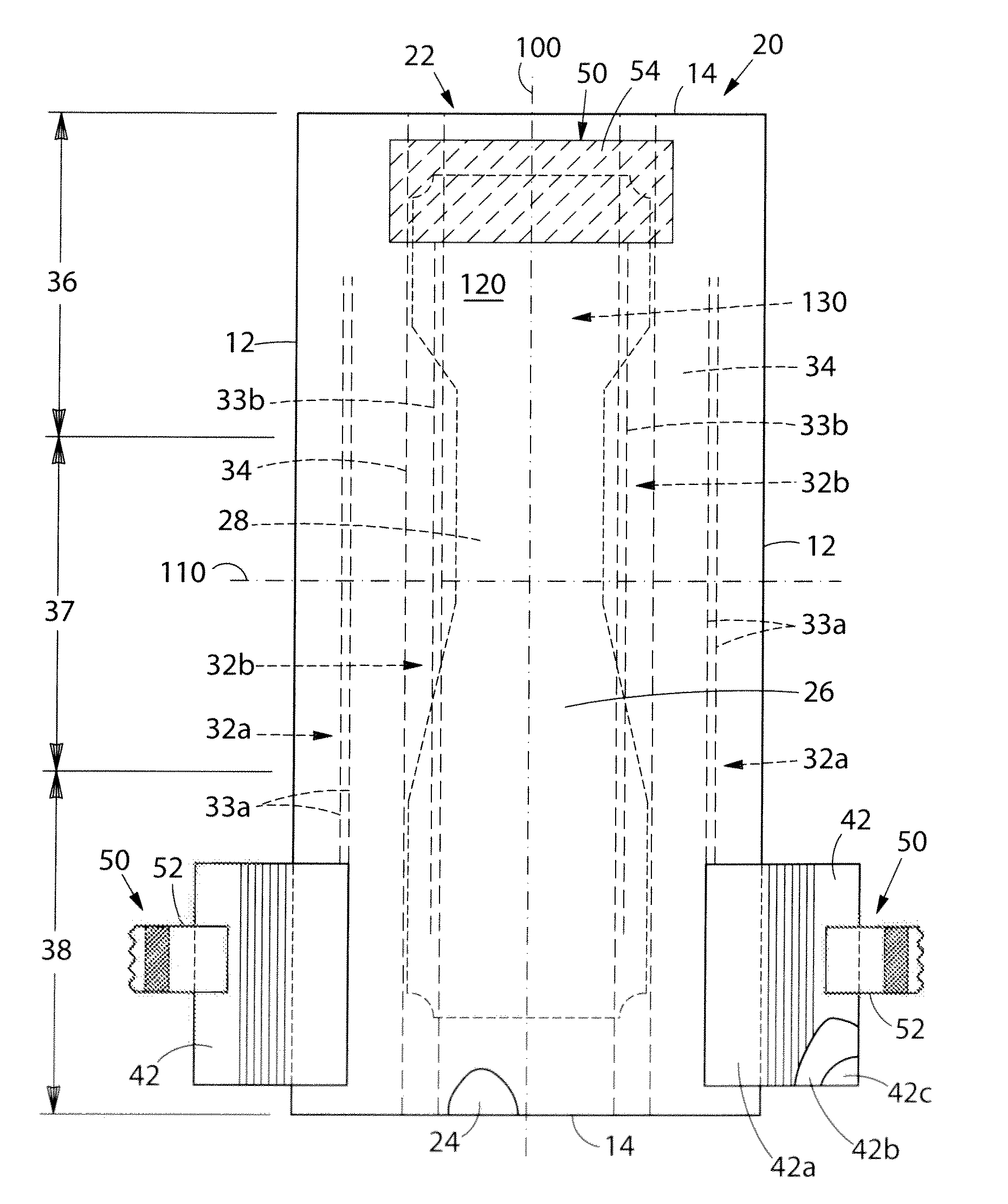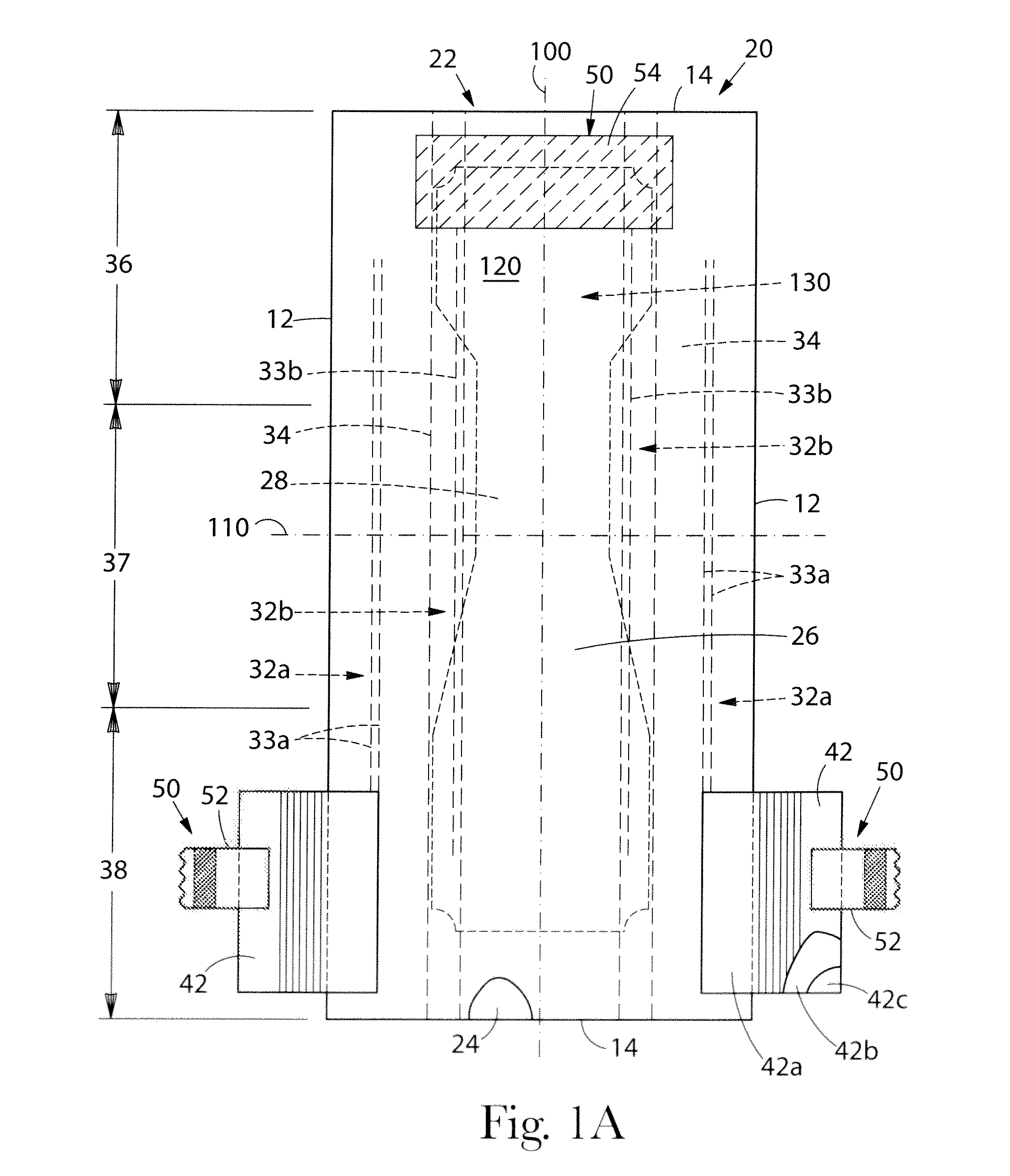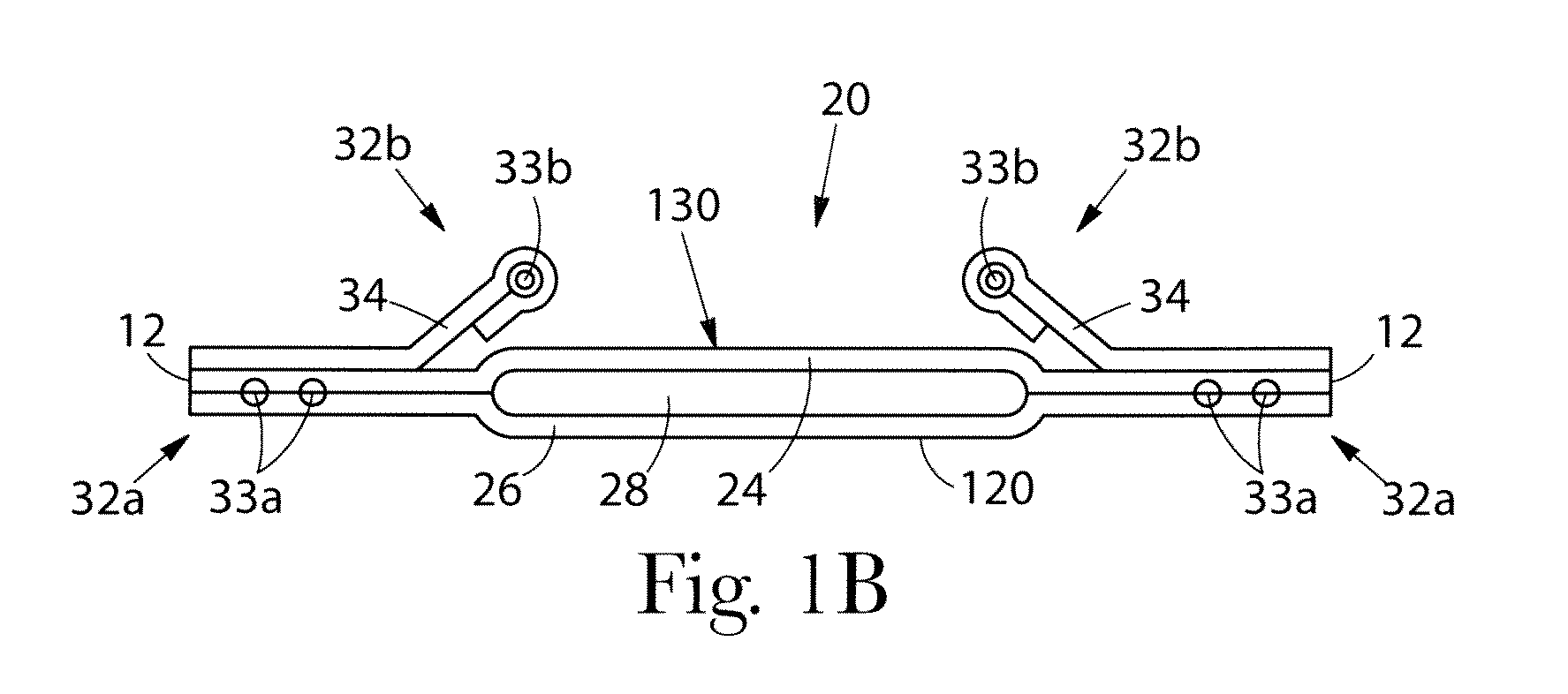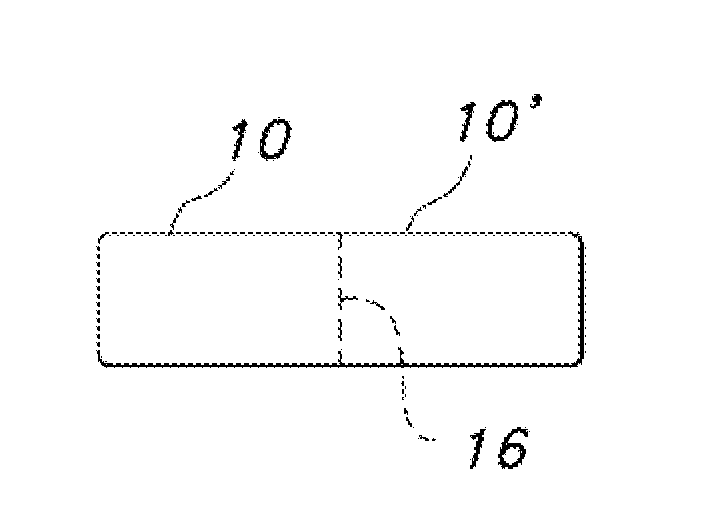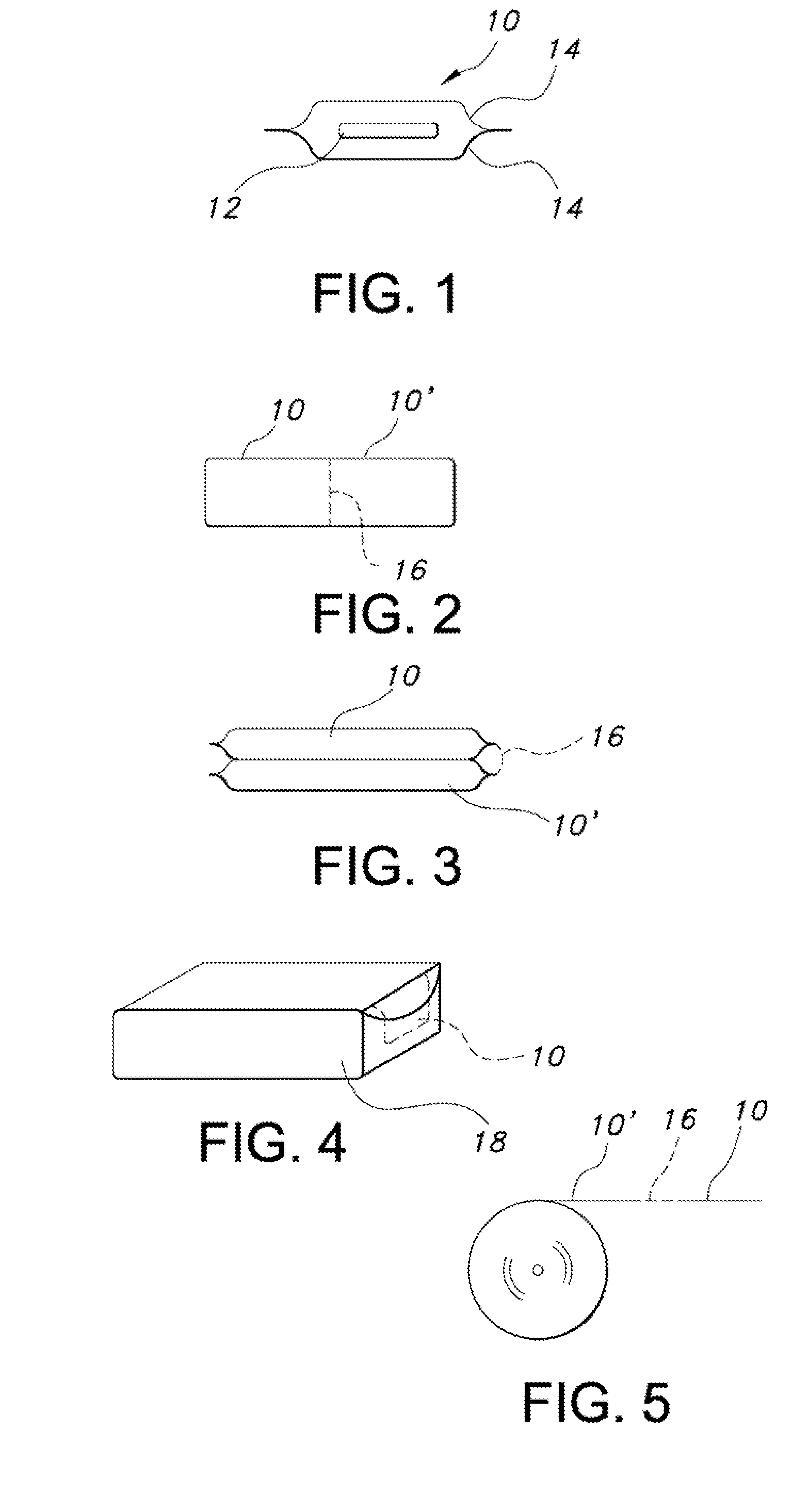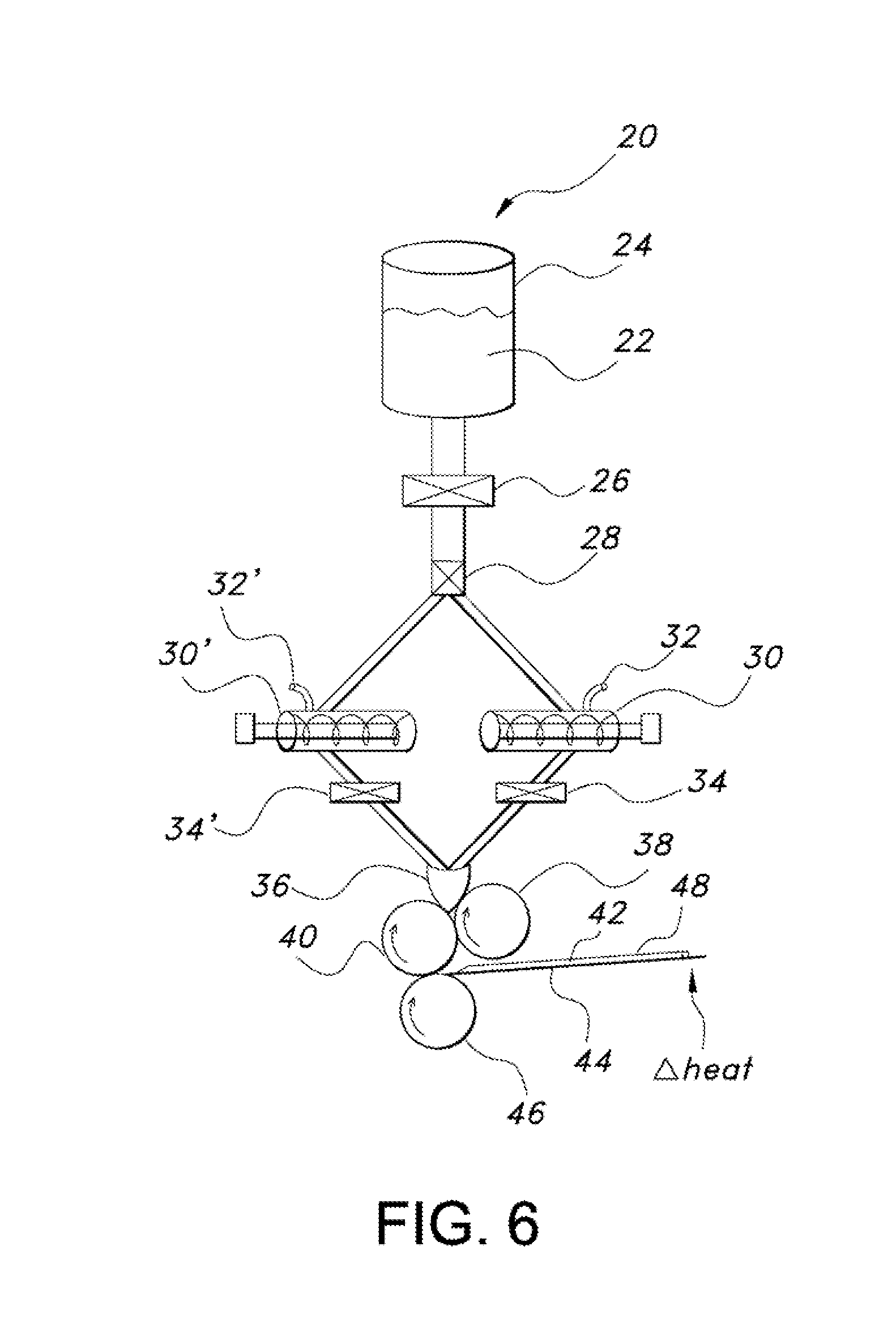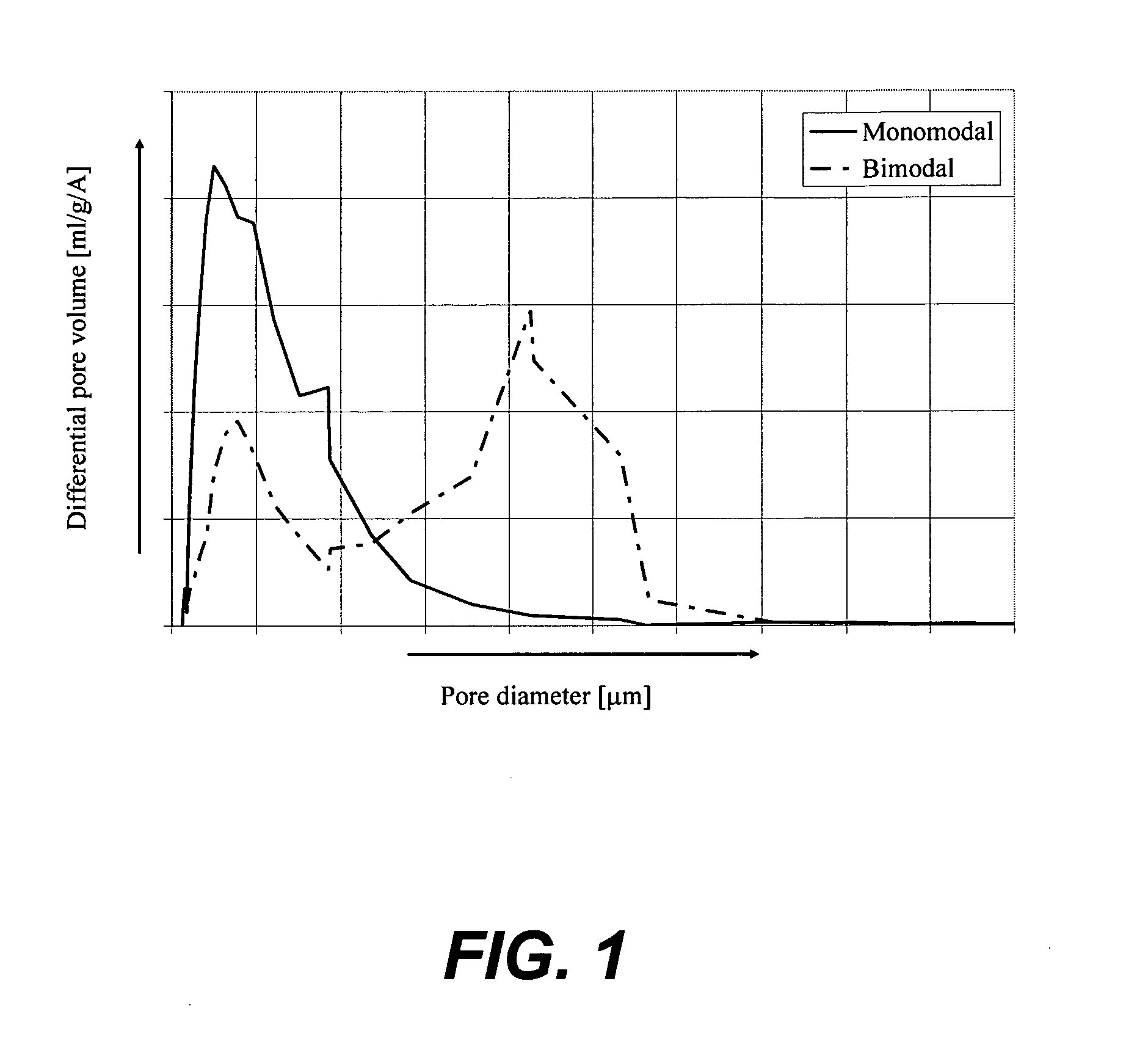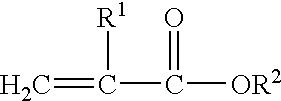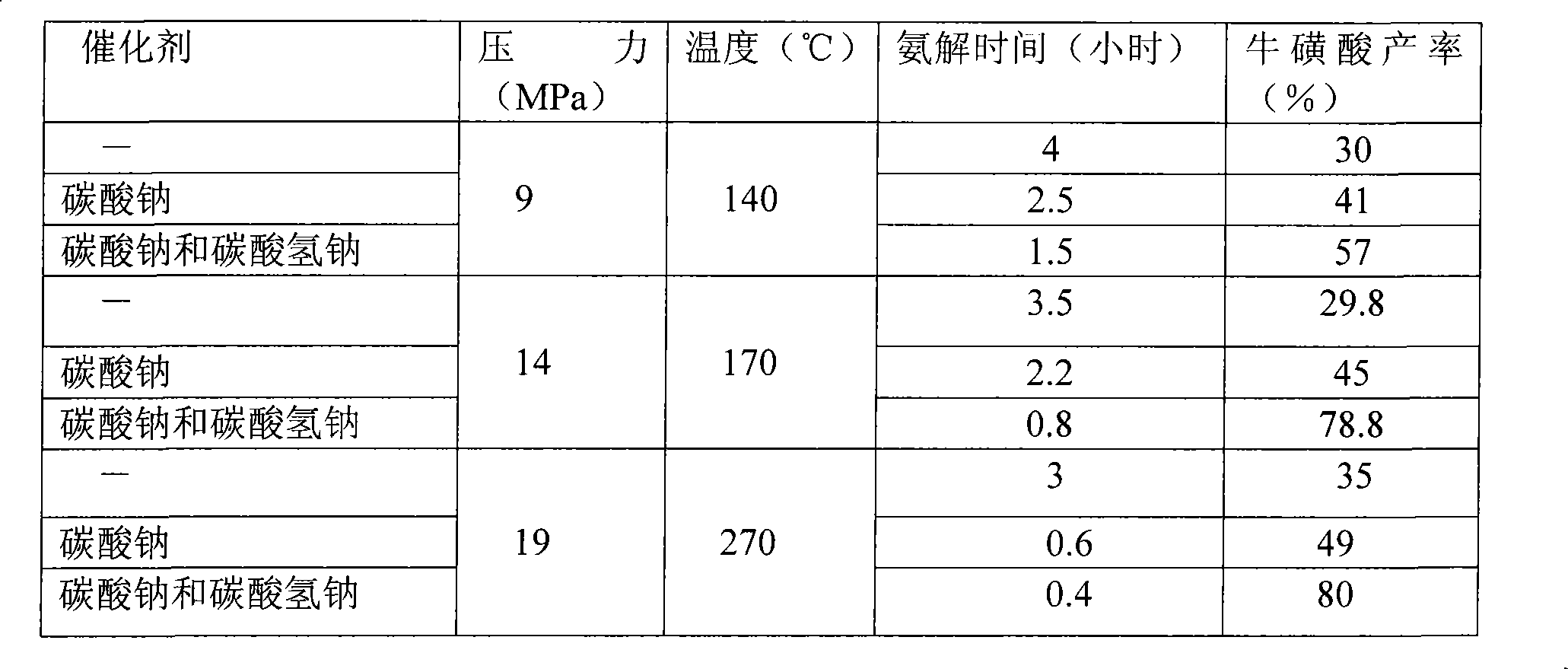Patents
Literature
Hiro is an intelligent assistant for R&D personnel, combined with Patent DNA, to facilitate innovative research.
5181 results about "Ethylene oxide" patented technology
Efficacy Topic
Property
Owner
Technical Advancement
Application Domain
Technology Topic
Technology Field Word
Patent Country/Region
Patent Type
Patent Status
Application Year
Inventor
Ethylene oxide, called oxirane by IUPAC, is an organic compound with the formula C₂H₄O. It is a cyclic ether and the simplest epoxide: a three-membered ring consisting of one oxygen atom and two carbon atoms. Ethylene oxide is a colorless and flammable gas with a faintly sweet odor. Because it is a strained ring, ethylene oxide easily participates in a number of addition reactions that result in ring-opening. Ethylene oxide is isomeric with acetaldehyde and with vinyl alcohol. Ethylene oxide is industrially produced by oxidation of ethylene in the presence of silver catalyst.
Sterilizable surgical instrument
A surgical instrument including a first portion and a second portion, wherein the second portion can be sterilized separately from the first portion. The first portion can comprise an anvil, a staple cartridge channel and / or staple cartridge, and a movable cutting member. The second portion can comprise electronic components configured to control the surgical instrument and / or record data collected during the use of the surgical instrument. The first portion can be sterilized using a gamma radiation sterilization process while the second portion can be sterilized using a different sterilization process, such as steam, ethylene oxide, ozone, and / or hydrogen peroxide sterilization processes, for example. As a result, the first and second portions can be sterilized separately and delivered in two separate containers. The second portion can be stored within a sealed bag and can include an electrical terminal which can penetrate the bag and communicate with the first portion.
Owner:CILAG GMBH INT
On-press developable IR sensitive printing plates using binder resins having polyethylene oxide segments
InactiveUS6899994B2Prevent steppingRadiation applicationsSemiconductor/solid-state device manufacturingPolymer sciencePolyethylene oxide
The present invention relates to a polymerizable coating composition suitable for the manufacture of printing plates developable on-press. The coating composition comprises (i) a polymerizable compound and (ii) a polymeric binder comprising polyethylene oxide segments, wherein the polymeric binder is selected from the group consisting of at least one graft copolymer comprising a main chain polymer and polyethylene oxide side chains, a block copolymer having at least one polyethylene oxide block and at least one non-polyethylene oxide block, and a combination thereof. The invention is also directed to an imageable element comprising a substrate and the polymerizable coating composition.
Owner:KODAK POLYCHROME GRAPHICS
Insulating boot for electrosurgical forceps
ActiveUS7879035B2Reduces the potential for strayDiagnosticsSurgical instrument detailsEthylene oxideEngineering
Either an endoscopic or open bipolar forceps includes a flexible, generally tubular insulating boot for insulating patient tissue, while not impeding motion of the jaw members. The jaw members are movable from an open to a closed position and the jaw members are connected to a source of electrosurgical energy such that the jaw members are capable of conducting energy through tissue held therebetween to effect a tissue seal. A knife assembly may be included that allows a user to selectively divide tissue upon actuation thereof. The insulating boot may be made from a viscoelastic, elastomeric or flexible material suitable for use with a sterilization process including ethylene oxide. An interior portion of the insulating boot may have at least one mechanically interfacing surface that interfaces with a mechanically interfacing surface formed between the shaft and a jaw member or with a mechanically interfacing surface disposed or formed on the shaft or a jaw member.
Owner:COVIDIEN AG
Breathable polyurethanes, blends, and articles
InactiveUS6897281B2Improve breathabilityImprove moisture vapor transmission rateSynthetic resin layered productsPolyurea/polyurethane coatingsGramSide chain
A breathable polyurethane having an upright moisture vapor transmission rate (MVTR) of more than about 500 gms / m2 / 24 hr comprises:(a) poly(alkylene oxide) side-chain units in an amount comprising about 12 wt. % to about 80 wt. % of said polyurethane, wherein (i) alkylene oxide groups in said poly(alkylene oxide) side-chain units have from 2 to 10 carbon atoms and are unsubstituted, substituted, or both unsubstituted and substituted, (ii) at least about 50 wt. % of said alkylene oxide groups are ethylene oxide, and (iii) said amount of said side-chain units is (i) at least about 30 wt. % when the molecular weight of said side-chain units is less than about 600 grams / mole, (ii) at least about 15 wt. % when the molecular weight of said side-chain units is from about 600 to about 1,000 grams / mole, and at least about 12 wt. % when the molecular weight of said side-chain units is more than about 1,000 grams / mole, and(b) poly(ethylene oxide) main-chain units in an amount comprising less than about 25 wt. % of said polyurethane.Coatings and films for textiles and other articles and applications using such polyurethanes have excellent breathability, i.e., high moisture vapor transmission rates (MVTR).
Owner:LUBRIZOL ADVANCED MATERIALS INC
Sterilizable surgical instrument
ActiveUS20100193569A1Avoid damageReduce the possibilitySuture equipmentsStapling toolsElectronic componentHydrogen Peroxide Sterilization
A surgical instrument including a first portion and a second portion, wherein the second portion can be sterilized separately from the first portion. The first portion can comprise an anvil, a staple cartridge channel and / or staple cartridge, and a movable cutting member. The second portion can comprise electronic components configured to control the surgical instrument and / or record data collected during the use of the surgical instrument. The first portion can be sterilized using a gamma radiation sterilization process while the second portion can be sterilized using a different sterilization process, such as steam, ethylene oxide, ozone, and / or hydrogen peroxide sterilization processes, for example. As a result, the first and second portions can be sterilized separately and delivered in two separate containers. The second portion can be stored within a sealed bag and can include an electrical terminal which can penetrate the bag and communicate with the first portion.
Owner:CILAG GMBH INT
Gas sampling line
ActiveUS20110237969A1Improve accuracyReduce distortion problemsDispersed particle separationRespiratory organ evaluationGas analysisPolyethylene oxide
Owner:JPMORGAN CHASE BANK NA
Printing plates using binder resins having polyethylene oxide segments
InactiveUS20050170286A1Prevent steppingRadiation applicationsSemiconductor/solid-state device manufacturingPolymer sciencePolyethylene oxide
The present invention relates to a polymerizable coating composition suitable for the manufacture of printing plates, which may be developable on-press. The coating composition comprises (i) a polymerizable compound and (ii) a polymeric binder comprising polyethylene oxide segments, wherein the polymeric binder is selected from the group consisting of at least one graft copolymer comprising a main chain polymer and polyethylene oxide side chains, a block copolymer having at least one polyethylene oxide block and at least one non-polyethylene oxide block, and a combination thereof. The invention is also directed to an imageable element comprising a substrate and the polymerizable coating composition.
Owner:EASTMAN KODAK CO
Silk biomaterials and methods of use thereof
ActiveUS7674882B2Avoid problemsReduce usagePeptide/protein ingredientsFilament/thread formingFiberIn vivo
The present invention provides an all-aqueous process and composition for production of silk biomaterials, e.g., fibers, films, foams and mats. In the process, at least one biocompatible polymer, such as poly(ethylene oxide) (PEO) (a well-documented biocompatible material), was blended with the silk protein prior to processing e.g., electrospinning. We discovered that this step avoids problems associated with conformational transitions of fibroin during solubilization and reprocessing from aqueous solution which lead to embrittled materials. Moreover, the process avoids the use of organic solvents that can pose problems when the processed biomaterials are exposed to cells in vitro or in vivo.
Owner:MASSACHUSETTS INST OF TECH +1
Aqueous dispersion of epoxy resin and blend of epoxy resin-polyoxyalkylene amines
PCT No. PCT / EP97 / 06364 Sec. 371 Date Sep. 25, 1998 Sec. 102(e) Date Sep. 25, 1998 PCT Filed Nov. 14, 1997 PCT Pub. No. WO98 / 25988 PCT Pub. Date Jun. 18, 1998A blend of epoxy-amine adducts are useful as emulsifiers of aqueous epoxy resin dispersions comprises (A-1) one or more epoxy-amine adduct(s) obtained by the reaction of (i) one or more aromatic, cycloaliphatic or novolac epoxy compound(s) and (ii) one or more amine-terminated polyalkylene glycol(s) having a molecular weight of from 700-5000 and an ethyleneoxide content of at least 60% by weight in an equivalent ratio of amine-terminated polyalkylene glycol(s) to epoxy compound(s) of from 0.01:1 to 0.9:1; (A-2) one or more epoxy-amine adduct(s) derived from the reaction of (i) one or more aliphatic epoxy compound(s) and (ii) one or more amine-terminated polyalkylene glycol(s) having a molecular weight of from 700-5000 and an ethyleneoxide content of at least 60% by weight in an equivalent ratio of amine-terminated polyalkylene glycol(s) to epoxy compound(s) of from 0.01:1 to 0.9:1; (B-1) aromatic, cycloaliphatic or novolac polyglycidyl ethers; (B-2) optionally, polyglycidyl esters of aromatic or cycloaliphatic polycarboxylic acids; and (C) optionally, at least one of reactive thinners, pigments, filler or other addtitives.
Owner:SIKA CHEM
Polyethylene oxide-based films and drug delivery systems made therefrom
The invention relates to the film products and methods of their preparation that demonstrate a non-self-aggregating uniform heterogeneity. Desirably, the films disintegrate in water and may be formed by a controlled drying process, or other process that maintains the required uniformity of the film. The films contain a polymer component, which includes polyethylene oxide optionally blended with hydrophilic cellulosic polymers. Desirably, the films also contain a pharmaceutical and / or cosmetic active agent with no more than a 10% variance of the active agent pharmaceutical and / or cosmetic active agent per unit area of the film.
Owner:AQUESTIVE THERAPEUTICS INC
Strip for whitening tooth surfaces
InactiveUS6514483B2Inhibition releaseCosmetic preparationsImpression capsWhitening AgentsEthylene oxide
A thin, flexible film which when applied to stained teeth is hydrated by saliva and is effective in such form to whiten teeth, the film comprising an anhydrous water hydratable ethylene oxide polymer matrix containing a solid peroxide whitening agent whereby upon application to stained tooth surfaces, the peroxide whitening agent is solublilized by saliva present in the oral cavity into active whitening activity when the film is positioned and placed on the teeth.
Owner:COLGATE PALMOLIVE CO
Spherical carriers for olefin polymerization catalyst and preparation method
ActiveCN102040683ANarrow particle size distributionParticles in good shapeParticle-size distributionPhotochemistry
The invention relates to spherical carriers for an olefin polymerization catalyst and a preparation method. Each spherical carrier comprises reaction products of the following components: (1) magnesium halide which is shown as the general formula MgX2, (2) alcohol compounds which are shown as the general formula ROH, and (3) ethylene oxide compounds which are shown as the general formula (I), wherein in the general formula (I), R2 and R3 are alkyls with a C1-C5 straight chain or branched chain; and hydrogen on the alkyls can be randomly substituted by a halogen atom. The spherical carriers have good particle shapes, adjustable particle sizes and narrow particle size distribution, and the preparation method is simple.
Owner:CHINA PETROLEUM & CHEM CORP +1
Storage stable isocyanate-reactive component containing vegetable oil-based polyol
The present invention provides an isocyanate-reactive component containing at least 10 wt. %, based on the weight of the isocyanate-reactive component, of a vegetable oil-based polyol, a nonionic emulsifier containing one of an aliphatic alcohol ethoxylate and an aliphatic phenol ethoxylate having a polymerized ethylene oxide content of at least 25 moles per equivalent of alcohol or phenol and a HLB value greater than 17, one or more non-vegetable oil-based polyols, one or more silicone surfactants, and optionally, water or other blowing agents, catalysts, pigments and fillers, wherein the isocyanate-reactive component is storage stable at temperatures of from −10° C. to 60° C. for at least three days. The inventive isocyanate-reactive component can be shipped and stored at normal shipping and storage temperatures and still produce acceptable foam on a daily basis whilst helping to satisfy polyurethane foam and elastomer producers' “green” requirements.
Owner:BAYER MATERIALSCIENCE AG
Control of polymer surface molecular architecture via amphipathic endgroups
ActiveUS20050282997A1Promote resultsReduce signal to noise ratioSurgeryCatheterPolymeric surfacePolyethylene oxide
Polymers whose surfaces are modified by endgroups that include amphipathic surface-modifying moieties. An amphipathic endgroup of a polymer molecule is an endgroup that contains at least two moieties of significantly differing composition, such that the amphipathic endgroup spontaneously rearranges its positioning in a polymer body to position the moiety on the surface of the body, depending upon the composition of the medium with which the body is in contact, when that re-positioning causes a reduction in interfacial energy. An example of an amphipathic surface-modifying endgroup is one that has both a hydrophobic moiety and a hydrophilic moiety in a single endgroup. For instance, a hydrophilic poly(ethylene oxide) terminated with a hydrophilic hydroxyl group is not surface active in air when the surface-modifying endgroup is bonded to a more hydrophobic base polymer. If the hydroxyl group on the oligomeric poly(ethylene oxide) is replaced by a hydrophobic methoxy ether terminus, the poly(ethylene oxide) becomes surface active in air, and allows the poly(ethylene oxide) groups to crystallize in the air-facing surface. In this example, immersion in water destroys the crystallinity as the poly(ethylene oxide) sorbs water and the hydrophobic methoxy group retreats below the surface of the polymer. Also disclosed are methods and articles of manufacture that make use of these polymers.
Owner:THE POLYMER TECH GROUP
Sensor with improved shelf life
InactiveUS20080121533A1Weather/light/corrosion resistanceVolume/mass flow measurementMetal electrodesEthylamine
Owner:LIFESCAN INC
Encapsulated fragrance chemicals
InactiveUS7125835B2Increase depositionCosmetic preparationsOrganic detergent compounding agentsPersonal careFlavor
A polymeric encapsulated fragrance is disclosed which is suitable for use in personal care and cleaning products. In a preferred embodiment of the invention, the fragrance is encapsulated by a first polymer material to form a fragrance encapsulated polymer, the polymer encapsulated shell is then coated with a mixture of cationic polymers, in a preferred embodiment the coating polymers are a reaction product of polyamines and (chloromethyl) oxirane or (bromomethyl) oxirane.
Owner:INTERNATIONAL FLAVORS & FRAGRANCES
High purity oxygen for ethylene oxide production
InactiveUS6040467AIncrease productionReduces required capital investmentOrganic compound preparationCarboxylic acid esters preparationEthylene oxideProduct gas
This invention is directed to a method for producing ethylene oxide comprising feeding ethylene, high purity oxygen and a ballast gas with a recycle gas in a catalyst filled reactor to form a gaseous mixture; passing the gaseous mixture from the reactor to a recovery unit to selectively separate ethylene oxide and carbon dioxide containing gas; passing at least a portion of the carbon dioxide containing gas to a stripping unit to selectively separate carbon dioxide and a waste gas; passing at least a portion of the waste gas to purge and another portion for recycling as the recycle gas; and recovering ethylene oxide from the recovery unit.
Owner:PRAXAIR TECH INC
Medical device with drug
A method of coating implantable open lattice metallic stent prosthesis is disclosed which includes sequentially applying a plurality of relatively thin outer layers of a coating composition comprising a solvent mixture of uncured polymeric silicone material and crosslinker and finely divided biologically active species, possibly of controlled average particle size, to form a coating on each stent surface. The coatings are cured in situ and the coated, cured prosthesis are sterilized in a step that includes preferred pretreatment with argon gas plasma and exposure to gamma radiation electron beam, ethylene oxide, steam.
Owner:BOSTON SCI SCIMED INC
Absorbent article comprising a synthetic polymer derived from a renewable resource and methods of producing said article
An element of an absorbent article is provided. The element has a bio-based content of at least about 50% based on the total weight of the element, and comprises a synthetic polymer derived from a renewable resource via a first intermediate compound selected from the group consisting of crotonic acid, propiolactone, ethylene oxide, i-propanol, butanol, butyric acid, propionic acid, 2-acetoxypropanoic acid, methyl 2-acetoxypropanoate, methyl lactate, ethyl lactate, polyhydroxybutyrate, and a polyhydroxyalkanoate comprising 3-hydroxypropionate monomers. An absorbent article comprising the element and a method of making an element for an absorbent article also are provided.
Owner:THE PROCTER & GAMBLE COMPANY
Polymer-Based Films and Drug Delivery Systems Made Therefrom
InactiveUS20070281003A1Pharmaceutical product form changeDrying machines with progressive movementsPolyethylene oxideActive agent
The invention relates to the film products and methods of their preparation that demonstrate a non-self-aggregating uniform heterogeneity. Desirably, the films disintegrate in water and may be formed by a controlled drying process, or other process that maintains the required uniformity of the film. The films contain a polymer component which includes polyethylene oxide, optionally blended with at least one additional polymer. The films may alternatively contain a polymer component which includes polyvinyl alcohol, optionally blended with at least one additional polymer. The films also may contain a pharmaceutical and / or cosmetic active agent.
Owner:MONOSOL RX
Finishing liquor applied on wet tissue and available for after-sun makeup removal and repair
InactiveCN103027867AHas the effect of repairing after sunDoes not contain EOCosmetic preparationsMake-upSide effectMedicine
The invention provides a finishing liquor applied on a wet tissue and available for after-sun makeup removal and repair. The finishing liquor contains ingredients such as a surfactant, a natural extract, an auxiliary, a stabilizer, a skin-moisturizing emollient, a repairing agent and a preservative. A production technology of the wet tissue finishing liquor comprises the steps of adding the ingredients in a stirring kettle in a certain sequence proportionally at normal temperature and normal pressure, and stirring the ingredients to a uniform and transparent liquid. The finishing liquor is moderate without irritation, green and environment-friendly, and free of any side effects after long-time use due to no EO (Ethylene Oxide); and the finishing liquor has an efficacy of cleaning and repairing after-sun skin.
Owner:TIANJIN SINOSH NEW MATERIAL TECH
Catalyst with bimodal pore size distribution and the use thereof
The invention pertains to a catalyst useful for the epoxidation of an olefin. More particularly, the invention pertains to an improved catalyst useful for the epoxidation of ethylene to ethylene oxide. The catalyst has improved selectivity in the epoxidation process. The catalyst comprises a solid support having a surface, which has a first mode of pores which have a diameter ranging from about 0.01 μm to about 5 μm and having a differential pore volume peak in the range of from about 0.01 μm to about 5 μm. The surface then has a second mode of pores, different from the first mode of pores, which second mode of pores have a diameter ranging from about 1 μm to about 20 μm and have a differential pore volume peak in the range of from about 1 μm to about 20 μm. On the bimodal pore surface is a catalytically effective amount of silver or a silver-containing compound, a promoting amount of rhenium or a rhenium-containing compound, and a promoting amount of one or more alkali metals or alkali-metal-containing compounds.
Owner:SD LIZENZVERWGMBH
Encapsulated fragrance chemicals
InactiveUS7196049B2Increase depositionCosmetic preparationsOrganic detergent compounding agentsPersonal careFlavor
A polymeric encapsulated fragrance is disclosed which is suitable for use in personal care and cleaning products. In a preferred embodiment of the invention, the fragrance is encapsulated by a first polymer material to form a fragrance encapsulated polymer, the polymer encapsulated shell is then coated with a mixture of cationic polymers, in a preferred embodiment the coating polymers are a reaction product of polyamines and (chloromethyl) oxirane or (bromomethyl) oxirane.
Owner:INTERNATIONAL FLAVORS & FRAGRANCES
Method for producing vinyl acetate monomer from ethane or ethylene oxidation
Methods for the catalytic production of vinyl acetate monomer from ethane, ethylene or an ethane / ethylene mixture using a first catalyst containing MoVNbPd, MoVLaPdNbX (where X is Al, Ga, Ge or Si) or MoVNbX (where X is P, B, Hf, Te, As or mixtures thereof) in the first step of oxidation and using a conventional VAM catalyst for the second step. The method produces high yields to acetic acid and vinyl acetate without the coproduction of carbon monoxide. Further-more, the ethylene and acetic acid produced in the first step may be utilized in the second step for VAM production
Owner:SAUDI BASIC IND CORP SA
Water-in-oil emulsions with ethylene oxide groups, compositions, and methods
Water-in-oil emulsions, compositions, and methods that include a vinyl polymer that includes ethylene oxide-containing side chains and alkyl-Y-containing side chains, wherein Y is O or NR, wherein R is H or CH3, and wherein the alkyl group of the alkyl-Y-containing side chain has at least 4 carbon atoms on average in a cyclic, branched-, or straight-chain configuration and optionally including one or more heteroatoms.
Owner:3M INNOVATIVE PROPERTIES CO
Synthesis of taurine
The invention relates to a method for synthesizing taurine, comprising the following steps: (1) according to the amount ratio of materials of 1:1 to 1:1.2, epoxy ethane and sodium bisulfite are subjected to addition reaction under 0.05 to 0.1MPa, with pH value of 6.5 to 7.5 and at a temperature between 75 and 85 DEG C to form hydroxyethyl sodium sulfonate; (2) the hydroxyethyl sodium sulfonate and liquid ammonia are subjected to ammonolysis reaction under 14 to 21MPa and at a temperature between 160 and 280 DEG C to generate sodium taurate, and the mass concentration of ammonia in the reaction liquid is 20 to 30 percent; and (3) neutralization: namely, the sodium taurate is neutralized by sulphuric acid to generate the taurine. The method for synthesizing the taurine has the advantages of short time, high yield and lower cost, and is easy for industrialized production.
Owner:王代龙 +1
Resilient cement compositions and methods of cementing
ActiveUS7022755B1Improved resilient cement compositionHigh compressiveDrilling compositionSulfonateEthylene oxide
Resilient cement compositions and methods of cementing using the compositions are disclosed. A resilient cement composition of the invention comprises hydraulic cement, an aqueous rubber latex and a rubber latex stabilizing surfactant comprising an iso-dodecyl alcohol ether sulfonate ethoxylated with from about 10 to about 20 moles of ethylene oxide.
Owner:HALLIBURTON ENERGY SERVICES INC
Cyclosporin compositions
A composition is disclosed herein comprising from about 0.001% to about 0.4% cyclosporin A, castor oil, and a surfactant selected from the group consisting of alcohol ethoxylates, alcohols, alkyl glycosides, alkyl polyglycosides, alkylphenol ethoxylates, amine oxides, block polymers, carboxylated alcohol or alkylphenol ethoxylates, carboxylic acids / fatty acids, cellulose derivatives, ethoxylated alcohols, ethoxylated alkylphenols, ethoxylated aryl phenols, ethoxylated fatty acids, ethoxylated fatty acids, ethoxylated fatty esters and oils, fatty alcohols, fatty esters, glycol esters, lanolin-based derivatives, lecithin and lecithin derivatives, lignin and lignin derivatives, methyl esters, monoglycerides and derivatives , phosphalipids, polyacrylic acids, polyethylene glycols, polyethylene oxide-polypropylene oxide copolymers, polyethylene oxides, polymeric surfactants, polypropylene oxides, propoxylated alcohols, propoxylated alkyl phenols, propoxylated fatty acids, protein-based surfactants, sarcosine derivatives, silicone-based surfactants, sorbitan derivatives, stearates, sucrose and glucose esters and derivatives, and combinations thereof.
Owner:SAINT REGIS MOHAWK TRIBE
Polymer Solid Electrolyte
InactiveUS6162563AEasy to processGood moldabilityHybrid capacitor electrolytesCell electrodesLithium metalBackbone chain
PCT No. PCT / JP97 / 02854 Sec. 371 Date Mar. 11, 1999 Sec. 102(e) Date Mar. 11, 1999 PCT Filed Aug. 19, 1997 PCT Pub. No. WO98 / 07772 PCT Pub. Date Feb. 26, 1998A polymer solid electrolyte obtained by blending (1) a polyether copolymer having a main chain derived form ethylene oxide and an oligooxyethylene side chain, (2) an electrolyte salt compound, and (3) a plasticizer of an aprotic organic solvent or a derivative or metal salt of a polyalkylene glycol having a number-average molecular weight of 200 to 5,000 or a metal salt of the derivative is superior in ionic conductivity and also superior in processability, moldability and mechanical strength to a conventional solid electrolyte. A secondary battery is constructed by using the polymer solid electrolyte in combination with a lithium metal negative electrode and a lithium cobaltate positive electrode.
Owner:OSAKA SODA CO LTD
Features
- R&D
- Intellectual Property
- Life Sciences
- Materials
- Tech Scout
Why Patsnap Eureka
- Unparalleled Data Quality
- Higher Quality Content
- 60% Fewer Hallucinations
Social media
Patsnap Eureka Blog
Learn More Browse by: Latest US Patents, China's latest patents, Technical Efficacy Thesaurus, Application Domain, Technology Topic, Popular Technical Reports.
© 2025 PatSnap. All rights reserved.Legal|Privacy policy|Modern Slavery Act Transparency Statement|Sitemap|About US| Contact US: help@patsnap.com

